Pharmacology
Introduction
The Department of pharmacology at JKKMMRF's Annai JKK Sampoorani Ammal College Of Pharmacy, Komarapalayam, Namakkal was established in 1989 with Diploma in pharmacy . The Department of Pharmacology was established in 1992 for undergraduate studies. Later, in 2008, the Department incorporated postgraduate course as well. Since then the department has grown by leaps and bounds in all areas who may subsequently go on to exciting research, regulatory and administrative careers in academic, industrial and healthcare provision settings.
In this direction, the department goal is to prepare exceptional students for productive and successful careers in pharmaceutical industry, academia, research and public sectors. Since 2007, The department has animal house approved by CPCSEA (Registration no: 1158/PO/Re/S/07/CPCSEA) for research and conducting experiments for education purpose on Mice, Rats, Guinea Pigs, and Rabbits.
Pharmacology is one of the core subjects of biomedical sciences contributing remarkably to other fields of biomedical sciences. Department offers curricula in four tracks at: Diploma in pharmacy, undergraduate, postgraduate and Ph.D. Adequate facilities are available in the department including animal quarantine to accomplish the objectives of the courses offered.
The Department of Pharmacology, main research areas are In-Vivo, In-Vitro and In-Silico pharmacological methods and actively involved in executing projects related to antiulcer, anthelmintic, arthritis, cancer, diabetes mellitus, hypertension, hyper-lipidemia, cardiovascular, psychopharmacology, neurodegenerative disorders like Alzheimer, Parkinson’s disorders, respiratory disease, drug delivery systems, drug interaction studies, toxicological evaluation.
Vision & Mission
Vision :
- To be nationally renowned for excellence in pharmacology research and Scholarship, with the ultimate goal of improving human health.
Mission :
- To improve the disciplines of Pharmacology and toxicology span basic mechanisms of drug discovery, action, metabolism, and distribution, along with studies of the therapeutic Action or adverse effects that chemicals/drugs have on biological systems.
- To integrate diverse basics and translational scientific investigations around common research interests, providing unique capabilities to promote the discovery and development of new therapeutics and address the impact of environmental toxins.
- To provide a dynamic and diverse academic environment that fosters innovative, ground-breaking research in basic and clinical pharmacology, therapeutics and toxicology.
- To promote strong evidence-based teaching and training for our students and trainees.
- To acquire new expertise in toxicology and drug metabolism.
- To promote interdisciplinary graduate and medical pharmacology education.
HOD Profile
Name : Dr.V.Suresh
Qualification : M.Pharm.,Ph.D.,
Department : Pharmacology
Designation : Professor and HOD
Date of Joining : 03.01.2007
Area of Research : Pharmacology, Pharmaceutical Analysis & Clinical Pharmacy

Dr. V.SURESH , M.Pharm., Ph.D.,
Professor and Head
|
Field of Specialization |
Pharmacology |
|
Phone No. |
04288-266032 |
|
|
|
|
Residential Address |
147/v7, Periyar Nagar, Anangoor pirivu road, Komarapalayam, Namakkal - district, Tamil Nadu - 638183. |
|
Experience |
17 years and 7 months. |
|
Blood Group |
B+ve |
Publication Details
International : 6
National : 24
Project details
UG : 12
PG : 38
Conference/ Workshop/ Symposium/ Seminar/FDP Attended : 42
Conference/ Workshop/ Symposium/ Seminar/FDP Conducted : 2
Resource Person in Conference/ Workshop/ Symposium/ Seminar/FDP : 1
Staff
Gallery
| |
Research Area
- Molecular Pharmacology research facility.
- in-vitro &in-vivo facilities for preclinical research
- Systemic and geno-toxicological screening of small molecules and biologicals following regulatory guidelines.
- Pharmacology & toxicology drug research and promote interdisciplinary research culture
- Development and screening of hits/leads from natural and synthetic compounds for metabolic, infective, and cardiovascular diseases.
- Therapeutic validation of small molecules on neurodegenerative diseases like Parkinson's disease, Alzheimer's disease, epilepsy, depression, cerebral stroke, sleep disorders using genomic and proteomics technique.
INSTRUMENTATION
|
1. |
ROTAROD APPARATUS |
|
2. |
ACTOPHOTOMETER |
|
3. |
HISTAMINE CHAMBER |
|
4. |
STUDENT BIO ASSAY INSTRUMENTS. |
|
5. |
GEL ELECTROPHORESIS |
|
6. |
COOLING CENTRIFUGE |
|
7. |
COOK'S POLE CLIMBING APPARATUS |
|
8. |
ELEVATED PLUS MAZE-RAT |
|
9. |
ELECTRO-CONVULSIOMETER |
|
10. |
OPEN FIELD TEST |
|
11. |
EDDY’S HOT PLATE |
|
12. |
ELEVATED PLUS MAZE-MICE |
|
13. |
SEMI AUTO ANALYSER |
|
14. |
DIGITAL PLETHYTHISMOGRAPH |
|
15. |
METABOLIC CAGE |
ROTAROD APPARATUS
HISTAMINE CHAMPER
GEL ELECTROPHOROSIS
COOKS POLE CLIMBING APPARATUS
COOLING CENTRIFUGE
OPEN FIELD APPARATUS
CELL ANALYSER & SEMI AUTO ANALYSER
METABOLIC CAGE
Events
Academic Year 2021-2022
| Date | Name of the Add on course/ workshop/ seminar | Details of Resource person with designation | No. of participants |
|---|---|---|---|
| 14/02/2022 | Probability Sampling | Dr.V.Suresh, HOD & Professor | 61 |
| Non-probability Sampling | Dr.V.Suresh, HOD & Professor | 65 | |
| 16/02/2022 | Simple Random Sampling | Dr.V.Suresh, HOD & Professor | 63 |
| Systematic Sampling | Dr.V.Suresh, HOD & Professor | 63 | |
| 18/02/2022 | Stratified Sampling | Dr.V.Suresh, HOD & Professor | 62 |
| Clustered Sampling | Mr. N. Deepan, Assistant Professor | 62 | |
| 21/02/2022 | Convenience Sampling | Mr. N. Deepan, Assistant Professor | 63 |
| Consecutive Sampling | Mr. N. Deepan, Assistant Professor | 62 | |
| 22/02/2022 | Quota Sampling | Mr. N. Deepan, Assistant Professor | 62 |
| Judgmental Sampling | Mr. N. Deepan, Assistant Professor | 62 | |
| 02/08/2021 | Need for research ethics | Dr.V.Suresh, HOD & Professor | 62 |
| Ethics of Research | Dr.V.Suresh, HOD & Professor | 62 | |
| 04/08/2021 | Publication Ethics | Dr.V.Suresh, HOD & Professor | 63 |
| Intellectual Property Rights (IPR) | Dr.V.Suresh, HOD & Professor | ||
| 15/08/2021 | Plagiarism | Dr.V.Suresh, HOD & Professor | 63 |
| Copy right | Mr.G. Thamotharan, Assiocate Professor | ||
| 25/08/2021 | Patent | Mr.G. Thamotharan, Assiocate Professor | 63 |
| Royalty | Mr.G. Thamotharan, Assiocate Professor | ||
| 28/08/2021 | Institutional Review Board | Mr.G. Thamotharan, Assiocate Professor | 63 |
| Utilization of research findings | Mr.G. Thamotharan, Assiocate Professor |
Academic Year 2020 -2021
| Date | Name of the Add on course/ workshop/ seminar | Details of Resource person with designation | No.of participants |
|---|---|---|---|
| 04/11/2020 | Essential features of abstract | Dr.V.Suresh, HOD & Professor | 61 |
| Essential features of introduction | Dr.V.Suresh, HOD & Professor | 65 | |
| 06/11/2020 | Review of literature of material and methods | Dr.V.Suresh, HOD & Professor | 63 |
| Review of literature of discussion | Dr.V.Suresh, HOD & Professor | 63 | |
| 08/11/2020 | Effective illustration | Dr.V.Suresh, HOD & Professor | 62 |
| Tables and figures | Mr. N. Deepan, Assistant Professor | 62 | |
| 12/11/2020 | Reference styles | Mr. N. Deepan, Assistant Professor | 61 |
| Strategy of project proposal | Mr. N. Deepan, Assistant Professor | 65 | |
| 21/11/2020 | Oral presentation | Mr. N. Deepan, Assistant Professor | 63 |
| Poster presentation | Mr. N. Deepan, Assistant Professor | 63 | |
| 06/07/2020 | Introduction to Data analysis softwares | Dr.V.Suresh, HOD & Professor | 61 |
| Types of Data analysis | Dr.V.Suresh, HOD & Professor | 65 | |
| 12/07/2020 | Application of Data analysis softwares | Dr.V.Suresh, HOD & Professor | 63 |
| SAS | Dr.V.Suresh, HOD & Professor | ||
| 18/07/2020 | SPSS | Dr.V.Suresh, HOD & Professor | 63 |
| STATA | Mr.G. Thamotharan, Assiocate Professor | ||
| 20/07/2020 | MINITAB | Mr.G. Thamotharan, Assiocate Professor | |
| MATLAB | Mr.G. Thamotharan, Assiocate Professor | ||
| 30/07/2020 | S-PLUS | Mr.G. Thamotharan, Assiocate Professor | |
| Graphpad-prism | Mr.G. Thamotharan, Assiocate Professor |
Academic Year 2019 -2020
| Date | Name of the Add on course/ workshop/ seminar | Details of Resource person with designation | No.of participants |
|---|---|---|---|
| 02/03/2020 | Introduction to Research | Dr.V.Suresh, HOD & Professor | 61 |
| Basic research | Dr.V.Suresh, HOD & Professor | 65 | |
| 06/03/2020 | Applied research | Dr.V.Suresh, HOD & Professor | 63 |
| Descriptive research | Dr.V.Suresh, HOD & Professor | 63 | |
| 08/03/2020 | Ethnographic research | Dr.V.Suresh, HOD & Professor | 64 |
| Exploratory research | Mr.G. Thamotharan, Assiocate Professor | 64 | |
| 15/03/2020 | Correlational research | Mr.G. Thamotharan, Assiocate Professor | 64 |
| Experimental research | Mr.G. Thamotharan, Assiocate Professor | 64 | |
| 26/03/2020 | Quasi - experimental research | Mr.G. Thamotharan, Assiocate Professor | 64 |
| Problems faced by Researchers | Mr.G. Thamotharan, Assiocate Professor | 64 | |
| 10/09/2019 | Introduction to Gastro-intestinal disorders | Dr.V.Suresh, HOD & Professor | 63 |
| in vitro antiulcer activity - Acid Neutralizing Capacity | Dr.V.Suresh, HOD & Professor | 63 | |
| 13/09/2019 | in vitro antiulcer activity - H+/K+ - ATPase Inhibition Activity | Dr.V.Suresh, HOD & Professor | 63 |
| Anti-ulcer activity-Pylorus ligation rat model | Dr.V.Suresh, HOD & Professor | ||
| 18/09/2019 | Anti-ulcer activity-NSAID’S induced ulcer model | Dr.V.Suresh, HOD & Professor | 63 |
| Anti-ulcer activity-Stress induced ulcer rat model. | Mr.G. Thamotharan, Assiocate Professor | ||
| 20/09/2019 | Anti-ulcer activity- Ethanol induced ulcer rat model. | Mr.G. Thamotharan, Assiocate Professor | 63 |
| Antidiarrheal activity in rat model | Mr.G. Thamotharan, Assiocate Professor | ||
| 27/09/2019 | In Vitro Anthelmintic Activity - Egg Hatch Inhibition Assay | Mr.G. Thamotharan, Assiocate Professor | |
| In Vitro Anthelmintic Activity - Adult worm Motility Assay | Mr.G. Thamotharan, Assiocate Professor |
Academic Year 2018 -2019
| Date | Name of the Add on course/ workshop/ seminar | Details of Resource person with designation | No. of participants |
|---|---|---|---|
| 04/02/2019 | Animal models for Pharmacological screening | Mr.G. Thamotharan, Assiocate Professor | 61 |
| Laws and Regulations for animal experiments | Mr.G. Thamotharan, Assiocate Professor | 65 | |
| 06/02/2019 | in vitro methods | Mr.G. Thamotharan, Assiocate Professor | 63 |
| in silico models | Mr.G. Thamotharan, Assiocate Professor | 63 | |
| 08/02/2019 | Zebrafish model | Mr.G. Thamotharan, Assiocate Professor | 62 |
| Earthworm model for Anthelmentic activity | Mr.G. Muthukumar, Assiocate Professor | 62 | |
| 12/02/2019 | Pigeon model for Malaria life cycle study | Mr.G. Muthukumar, Assiocate Professor | 64 |
| Chicken model for Antineuritic and growth stimulating vitamins study | Mr.G. Muthukumar, Assiocate Professor | 64 | |
| 14/02/2019 | Sheep model for Pathogenesis of tuberculosis | Mr.G. Muthukumar, Assiocate Professor | 64 |
| Toad model for Catalytic conversion glycogen study | Mr.G. Muthukumar, Associate Professor | 64 | |
| 10/09/2018 | Introduction- Current scenario of Neuro-Pharmacology | Mr. Kannan. R, Assistant Professor | 64 |
| in vitro AchE inhibition assay | Mr. Kannan. R, Assistant Professor | 64 | |
| 13/09/2018 | SH-SY5Y Cell line study | Mr. Kannan. R, Assistant Professor | 64 |
| Locomotor activity screening | Mr. S.Kannan, Assistant Professor | ||
| 18/09/2018 | Anticonvulsant activity screening | Mr.Kannan. R, Assistant Professor | 64 |
| Antianxiety activity screening | Mr.G. Thamotharan, Assiocate Professor | ||
| 20/09/2018 | Skeletal muscle relaxant activity | Mr.G. Thamotharan, Assiocate Professor | 64 |
| Antidepressant screening | Mr.G. Thamotharan, Assiocate Professor | ||
| 28/09/2018 | Stereotaxic surgery (ICV injection) | Mr.G. Thamotharan, Assiocate Professor | 64 |
| Brain homogenate preparation | Mr.G. Thamotharan, Assiocate Professor |
Academic Year 2017 -2018
| Date | Name of the Add on course/ workshop/ seminar | Details of Resource person with designation | No. of participants |
|---|---|---|---|
| 10/04/2018 | Metabolic Disorder | Mr.G. Thamotharan, Assiocate Professor | 63 |
| Introduction to Diabetic Research | Mr.G. Thamotharan, Assiocate Professor | 65 | |
| 16/04/2018 | Need of Diabetic research | Mr.G. Thamotharan, Assiocate Professor | 63 |
| Insulin secretion and regulation of blood glucose | Mr.G. Thamotharan, Assiocate Professor | 63 | |
| 19/04/2018 | in-vitro diabetic screening methods | Mr.G. Thamotharan, Assiocate Professor | 62 |
| in-vitro pancreatic β-cell line models | Mr.G. Muthukumar, Assiocate Professor | 62 | |
| 23/04/2018 | in-vivo diabetic screening methods | Mr.G. Muthukumar, Assiocate Professor | 63 |
| OGTT monitoring | Mr.G. Muthukumar, Assiocate Professor | 63 | |
| 25/04/2018 | Alloxan induced diabetic rat model | Mr.G. Muthukumar, Assiocate Professor | 63 |
| Streptozotocin induced diabetic rat model | Mr.G. Muthukumar, Assiocate Professor | 63 | |
| 02/01/2018 | Introduction to Cardiac Disorders | Dr.V.Suresh, HOD & Professor | 63 |
| Diagnosis of Cardiac Disorders | Dr.V.Suresh, HOD & Professor | 63 | |
| 13/01/2018 | Arrthymiasis | Dr.V.Suresh, HOD & Professor | 64 |
| Congestive heart failure | Dr.V.Suresh, HOD & Professor | ||
| 18/01/2018 | Introduction to ECG | Dr.V.Suresh, HOD & Professor | 64 |
| Instrumentation of ECG | Mr.G. Thamotharan, Assiocate Professor | ||
| 20/01/2018 | ECG Procedure | Mr.G. Thamotharan, Assiocate Professor | 64 |
| Introduction to ECMO Therapy | Mr.G. Thamotharan, Assiocate Professor | ||
| 28/01/2018 | Instrumentation of ECMO | Mr.G. Thamotharan, Assiocate Professor | 64 |
| ECMO Therapy Procedure | Mr.G. Thamotharan, Assiocate Professor |
M.PHARM (PHARMACOLOGY)
PROGRAMME EDUCATIONAL OUTCOMES (PEOs)
|
PEO - 1 |
To produce pharmacy post-graduates with strong fundamental concepts and high technical competence in pharmaceutical sciences and technology, who shall be able to use these tools in pharmaceutical industry and/or institutes where ever necessary for success. |
|
PEO - 2 |
To promote the development of trained human resource in Pharmaceutical Sciences for dissemination of quality education with highly professional and ethical attitude, strong communication skills, effective skills to work in a team with a multidisciplinary approach. |
|
PEO - 3 |
To generate potential knowledge pools with interpersonal and collaborative skills to identify, assess and formulate problems and execute the solution in closely related pharmaceutical industries. |
PROGRAMME SPECIFIC OUTCOMES (PSOs)
|
PSO - 1 |
Interpret data of pharmaceutical experiments in drug discovery as per the needs of pharmaceutical industries. |
|
PSO - 2 |
Evaluate current drug information in the delivery of pharmaceutical care and assure in regard to drug usage and their adverse effects. |
PROGRAMME OUTCOMES (PO)
M.PHARM (PHARMACOLOGY)
|
PO - 1 |
To be able to independently carry out research and development work utilizing modern tools and employing planning and problem analysis skills to solve practical problems |
|
PO - 2 |
To be able to write and present substantial technical documents / reports and communicate effectively |
|
PO - 3 |
To be able to demonstrate a degree of mastery over the area of specialization in terms of pharmaceutical knowledge, learning aptitude, managerial and administrative skills, computational and informatics skills in academia, manufacturing, clinical and allied sectors |
|
PO - 4 |
To be able to lead in terms of team building, planning, motivating and ethically executing professional responsibilities and establish professional identity in the society |
|
PO - 5 |
To be able to comprehend the impact of the pharmaceutical solutions in societal and environmental co texts, and explore the knowledge of and need for sustainable development and apply the knowledge to solve such problems. |
|
PO - 6 |
To be able to relate the acquired scientific information and principles of pharmacokinetics and pharmacodynamics in drug discovery process. |
|
PO - 7 |
To be able to interpret data of Pharmaceutical experiments in drug discovery as per the needs of Pharmaceutical industries. |
|
PO - 8 |
To be able to demonstrate knowledge of Professional and ethical responsibilities in clinical and non-clinical laboratory as required by regulatory bodies. |
|
PO - 9 |
To be able to evaluate current drug information in the delivery of Pharmaceutical care and assure in regard to drug usage and their adverse effects. |
|
PO - 10 |
To be able to retrieve, analyze, interpret and formulate drug or medicine information. |
COURSE OUTCOMES
|
M.PHARM (PHARMACOLOGY ) - YEAR - I (SEMESTER - I) |
|
|
MPL101T |
Modern Pharmaceutical Analytical Techniques |
|
CO - 1 |
Understand the interaction of matter with electromagnetic radiations and its applications in drug analysis using various analytical instruments |
|
CO - 2 |
Develops ability to involve in the quantitative & qualitative chromatographic separation and analysis of drugs |
|
CO - 3 |
It facilitates the students to perform the thermal method of analysis of drugs using different instruments |
|
CO - 4 |
Understand the principles of Nmr, Mass, X Ray Techniques and assays |
|
CO - 5 |
Able to do the statistical analysis using student T test,F test,chi-square test |
|
M.PHARM (PHARMACOLOGY ) - YEAR - I (SEMESTER - I) |
|
|
MPL102T |
Advanced Pharmacology-I |
|
CO - 1 |
Apply the basic pharmacological knowledge in the prevention and treatment of various diseases. |
|
CO - 2 |
Explain the mechanism of drug action at the organ system / subcellular/macromolecular and molecular levels. |
|
CO - 3 |
Understand the pharmacological actions, mechanism of drug action and its relevance in the treatment of different diseases in different categories of drugs |
|
CO - 4 |
Be aware about the pathophysiology and pharmacotherapy of certain diseases |
|
CO - 5 |
Comprehend the adverse effects, contraindications and clinical uses of drugs used in treatment of diseases. |
|
M.PHARM (PHARMACOLOGY ) - YEAR - I (SEMESTER - I) |
|
|
MPL 103T |
Pharmacological and Toxicological Screening Methods-I |
|
CO - 1 |
Students will be able to appraise the regulations and ethical requirement for the usage of experimental animals |
|
CO - 2 |
Students will be able to describe the various animals used in the drug discovery process |
|
CO - 3 |
Students will be able to describe good laboratory practices in maintenance and handling of experimental animals |
|
CO - 4 |
Students will be able to describe the various newer pre-clinical screening methods involved in the drug discovery process |
|
CO - 5 |
Students will be able to appreciate and correlate the preclinical data to humans |
|
M.PHARM (PHARMACOLOGY ) - YEAR - I (SEMESTER - I) |
|
|
MPL104T |
Cellular and Molecular Pharmacology |
|
CO - 1 |
Know about different cellular types, cellular reproduction and reactions |
|
CO - 2 |
Learn about cellular genetic material and its functions |
|
CO - 3 |
Learn about structure, regulation of synthesis and functions of proteins |
|
CO - 4 |
Learn about mechanisms of cell division and its regulation |
|
CO - 5 |
Understand about communication between cells via signals and missignalling |
|
M.PHARM (PHARMACOLOGY ) - YEAR - I (SEMESTER - I) |
|
|
MPL105P |
Pharmacology Practical I |
|
CO - 1 |
Students were able to design & analyze the given sample of drugs using spectroscopic, chromatographic, fluorimetry and flame photometry. |
|
CO - 2 |
Students were able to perform experiment with rodents for CNS related activities, diuretics and GI effects. |
|
CO - 3 |
Students were able to administer drugs in the animals, withdraw blood samples and assess the efficacy & safety of the given unknown compound. |
|
CO - 4 |
Students were able to handle molecular techniques to understand molecular biology, including in vitro cell culture techniques. |
|
CO - 5 |
Students were able to assess the genetic alterations using molecular techniques. |
|
M.PHARM (PHARMACOLOGY ) - YEAR - I (SEMESTER - II) |
|
MPL201T |
Advanced Pharmacology II |
|
CO - 1 |
Apply the basic pharmacological knowledge in the prevention and treatment of various diseases |
|
CO - 2 |
Explain the mechanism of drug action at the organ system / subcellular/macromolecular and molecular levels. |
|
CO - 3 |
Understand the pharmacological actions, mechanism of drug action and its relevance in the treatment of different diseases in different categories of drugs |
|
CO - 4 |
Be aware about the pathophysiology and pharmacotherapy of certain diseases |
|
CO - 5 |
Comprehend the adverse effects, contraindications and clinical uses of drugs used in treatment of diseases. |
|
M.PHARM (PHARMACOLOGY ) - YEAR - I (SEMESTER - II) |
|
|
MPL 202T |
Pharmacological and Toxicological Screening Methods-II |
|
CO - 1 |
Students will be able to appraise the regulations and ethical requirement for the usage of experimental animals |
|
CO - 2 |
Students will be able to describe the various animals used in the drug discovery process |
|
CO - 3 |
Students will be able to describe good laboratory practices in maintenance and handling of experimental animals |
|
CO - 4 |
Students will be able to describe the various newer pre-clinical screening methods involved in the drug discovery process |
|
CO - 5 |
Students will be able to appreciate and correlate the preclinical data to humans |
|
M.PHARM (PHARMACOLOGY ) - YEAR - I (SEMESTER - II) |
|
|
MPL203T |
Principles of Drug Discovery |
|
CO - 1 |
Students were able to understand Drug discovery process and stages in the drug discovery programme. |
|
CO - 2 |
programme. Students were able to explain the basics of Targets, its identification, validation, protein structures & its modification in drug discovery approach. |
|
CO - 3 |
Students were able to develop leads and protocol to identify leads, its optimization procedures and its sources and able to differentiate lead and hits. |
|
CO - 4 |
Drug designing protocols, application of QSAR in drug discovery and lead developments, its statistical methodology to validate QSAR equations. |
|
CO - 5 |
Rational drug discovery, pharmacophore identification, in silico drug synthesis using softwares programmes and significance of prodrug concepts. |
|
M.PHARM (PHARMACOLOGY ) - YEAR - I (SEMESTER - II) |
|
|
MPL204T |
Clinical Research and Pharmacovigilance |
|
CO - 1 |
The students will be capable of explaining the regulatory requirement for conducting clinical trial |
|
CO - 2 |
The students will be able to demonstrate the type of clinical trial design |
|
CO - 3 |
The students will understand the responsibilities of key players in clinical trials |
|
CO - 4 |
The students will understand principles of pharmacovigilance and safety monitoring system |
|
CO - 5 |
The students will understand Pharmcoepidemiology & economics |
|
M.PHARM (PHARMACOLOGY ) - YEAR - I (SEMESTER - II) |
|
|
MPL205P |
Experimental Pharmacology - II |
|
CO - 1 |
Students were able to design and perform in vitro pharmacological experiments using various isolated tissue preparations |
|
CO - 2 |
Students were able to quantitatively estimate the biological samples using isolated tissue preparations and interpret to calculate the PD2 & PA2 values |
|
CO - 3 |
Students were able to understand the OECD guidelines and perform acute toxicity studies for safety evaluations and able to interpret the pharmacokinetic profile of the given drug. |
|
CO - 4 |
Students will able to understand Cardiovascular responses using proper experimental techniques, drug efficacy and able to design & conduct clinical trials and ADR monitoring. |
|
CO - 5 |
Understanding the drug discovery process and able to develop a new drug through in silico techniques. |
|
M.PHARM - YEAR - II (SEMESTER - III) COMMON TO ALL BRANCHES |
|
|
MRM 301T |
Research Methodology and Biostatistics |
|
CO - 1 |
Students should understand a general definition of research design |
|
CO - 2 |
Students should be able to identify the overall process of designing a research study and the use of various statistical test involved |
|
CO - 3 |
Students should be familiar with human ethical issues in educational research, including those issues that arise in using quantitative and qualitative research |
|
CO - 4 |
Students should know the guidelines in performing animal study and maintenance of animal house. |
|
CO - 5 |
Students should be familiar with declaration of Helsinki |
|
M.PHARM - YEAR - II (SEMESTER - III & IV) COMMON TO ALL BRANCHES |
|
|
|
JOURNAL CLUB |
|
CO - 1 |
Able to collect relevant literature and critically evaluate them |
|
CO - 2 |
Learnt to make a PPT presentation scientifically and deliver the same |
|
CO - 3 |
Able to involve effectively in post presentation discussion |
|
M.PHARM - YEAR - II (SEMESTER - III & IV) COMMON TO ALL BRANCHES |
|
|
|
DISCUSSION / PRESENTATION (PROPOSAL PRESENTATION) |
|
CO - 1 |
Able to select research topic through literature review |
|
CO - 2 |
Able to design research methodology |
|
CO - 3 |
Able to Present the selected research proposal convincingly |
|
M.PHARM - YEAR - II (SEMESTER - III & IV) COMMON TO ALL BRANCHES |
|
|
|
RESEARCH WORK |
|
CO - 1 |
Able to carry out research work scientifically following research ethics
|
|
CO - 2 |
Able to collect date, interpret them using appropriate statistical tools and arrive at conclusion scientifically |
|
CO - 3 |
Able to document the research work in the form of thesis in an acceptable format |
|
M.PHARM - YEAR - II (SEMESTER - IV) COMMON TO ALL BRANCHES |
|
|
|
RESEARCH WORK |
|
CO - 1 |
Able to carry out research work scientifically following research ethics |
|
CO - 2 |
Able to collect date, interpret them using appropriate statistical tools and arrive at conclusion scientifically |
|
CO - 3 |
Able to document the research work in the form of thesis in an acceptable format |
|
M.PHARM - YEAR - II (SEMESTER - IV) COMMON TO ALL BRANCHES |
|
|
|
DISCUSSION/FINAL PRESENTATION |
|
CO - 1 |
Able to organize the research work for presentation |
|
CO - 2 |
Able to make PPT presentation of the research work scientifically and deliver the same |
|
CO - 3 |
Learnt to defend the research work scientifically and convincingly |
PHARM.D
PROGRAMME EDUCATIONAL OUTCOMES (PEOs)
|
PEO - 1 |
The student will possess professional knowledge of pharmaceutical sciences and technology applicable in pharmaceutical, healthcare industry, community pharmacy and academia as per the requirement. |
|
PEO - 2 |
With the grooming and knowledge gained, the student will play a major role as professional Pharmacist in the health care team and participate in implementation of various health programs at large. |
|
PEO - 3 |
The student will inculcate the urge for lifelong learning and up - gradation to meet the needs of the profession and society. |
PROGRAMME SPECIFIC OUTCOMES (PSOs)
|
PSO - 1 |
Apply and assess the literature and other research resources to provide evidence-based drug information that meets the needs of patients and other health care providers. |
|
PSO - 2 |
Discuss how patients and care givers can obtain the most cost-efficient medications and related pharmaceuticals per patient-specific health insurance coverage options. |
PROGRAMME OUTCOMES (PO)
PHARM D
|
PO - 1 |
Pharmacy Knowledge: Possess knowledge and comprehension of the core and basic knowledge associated with the profession of pharmacy, including biomedical sciences; pharmaceutical sciences; behavioral, social, and administrative pharmacy sciences; and manufacturing practices. |
|
PO - 2 |
Planning Abilities: Demonstrate effective planning abilities including time management, resource management, delegation skills and organizational skills. Develop and implement plans and organize work to meet deadlines. |
|
PO - 3 |
Problem analysis: Utilize the principles of scientific enquiry, thinking analytically, clearly and critically, while solving problems and making decisions during daily practice. Find, analyze, evaluate and apply information systematically and shall make defensible decisions. |
|
PO - 4 |
Modern tool us age: Learn, select, and apply appropriate methods and procedures, resources, and modern pharmacy-related computing tools with an understanding of the limitations. |
|
PO - 5 |
Leadership skills: Understand and consider the human reaction to change, motivation issues, leadership and team-building when planning changes required for fulfillment of practice, professional and societal responsibilities. Assume participatory roles as responsible citizens or leadership roles when appropriate to facilitate improvement in health and well-being. |
|
PO - 6 |
Professional Identity: Understand, analyze and communicate the value of their professional roles in society (e.g. health care professionals, promoters of health, educators, managers, employers, employees) |
|
PO - 7 |
Pharmaceutical Ethics: Honor personal values and apply ethical principles in professional and social contexts. Demonstrate behavior that recognizes cultural and personal variability in values, communication and lifestyles. Use ethical frameworks; apply ethical principles while making decisions and take responsibility for the outcomes associated with the decisions. |
|
PO - 8 |
Communication: Communicate effectively with the pharmacy community and with society at large, such as, being able to comprehend and write effective reports, make effective presentations and documentation, and give and receive clear instructions. |
|
PO - 9 |
The Pharmacist and society: Apply reasoning informed by the contextual knowledge to assess societal, health, safety and legal issues and the consequent responsibilities relevant to the professional pharmacy practice. |
COURSE OUTCOMES
|
PHARM D - Ist YEAR |
|
|
1.1 |
Human Anatomy and Physiology (THEORY) |
|
CO - 1 |
Identify general terminology, cell structure and function, histology of various tissues and organs of different systems of human body. |
|
CO - 2 |
Explain the gross morphology, structure and functions of various organs of the human body. |
|
CO - 3 |
Describe the various homeostatic mechanisms and their imbalances |
|
CO - 4 |
Describe the flow of blood through the heart and the role of each atrium, ventricle, and valve in this process. |
|
CO - 5 |
Appreciate coordinated working pattern of different organs of each system |
|
|
|
|
1.1 |
Human Anatomy and Physiology (PRACTICAL) |
|
CO - 1 |
Identify the various tissues and organs of different systems of human body. |
|
CO - 2 |
Describe the different types of bones and provide an example of each type. |
|
CO - 3 |
Locate and identify anatomical structures that surround and protect the brain |
|
CO - 4 |
Perform the hematological tests like blood cell counts, haemoglobin estimation, bleeding/clotting time etc and also record blood pressure, heart rate, pulse and respiratory volume |
|
CO - 5 |
Analyze the various experiments related to heart on normal human beings. |
|
PHARM D - 2nd YEAR |
|
|
2.4 |
Pharmacology - I (THEORY) |
|
CO - 1 |
Define the basic terms of Medical Pharmacology |
|
CO - 2 |
Select the appropriate dose and routes for drugs administration |
|
CO - 3 |
Describe the pattern of absorption, distribution, metabolism and excretion of various drugs |
|
CO - 4 |
Classify the drugs based on the mechanism of action and indications |
|
CO - 5 |
Identify the types of adverse drug reactions, drug-drug interactions, food-drug interactions and contraindications |
|
PHARM D - 3rd YEAR |
|
|
3.1 |
Pharmacology- II (THEORY) |
|
CO - 1 |
Identify and explain the pharmacodynamics and pharmacokinetic properties of drugs of various categories |
|
CO - 2 |
Recognize the adverse effects of drugs |
|
CO - 3 |
Recognize indications of different drugs and avoid contraindications |
|
CO - 4 |
Provide vital information to patients about drugs during patient counseling |
|
CO - 5 |
Design & execute animal experiments to identify the pharmacological properties of known drugs and unknown samples |
|
|
|
|
3.1 |
Pharmacology- II (PRACTICAL) |
|
CO - 1 |
Define the basic concepts of experimental pharmacology. |
|
CO - 2 |
Identify the commonly used laboratory animals and apparatus in pharmacology |
|
CO - 3 |
Calculate the dose and decide the route of administration of drugs. |
|
CO - 4 |
Design experiments to test the safety and efficacy of experimental drugs |
|
CO - 5 |
Design and execute a bioassay to determine the potency of experimental drugs. |
|
PHARM D - 4th YEAR |
|
|
4.6 |
Clinical Toxicology (THEORY) |
|
CO - 1 |
Demonstrate the basic understanding of general principles and fundamentals of poisoning |
|
CO - 2 |
Evaluate and categorize the type of poisoning based on clinical presentation and Toxic syndrome |
|
CO - 3 |
Assess the type of management applicable to poison |
|
CO - 4 |
Estimate the antidote and its application for specific poison |
|
CO - 5 |
Provide awareness to the public to prevent Accidental poisoning |
B.PHARM
PROGRAMME EDUCATIONAL OUTCOMES (PEOs)
|
PEO - 1 |
To produce pharmacy graduates with strong basics and high technical knowledge to cater the various areas of Pharmaceutical Industry. |
|
PEO - 2 |
Graduates will be able to discharge the responsibilities of pharmacist with adequate understanding of supportive area as needed in this multidisciplinary area of health care system. |
|
PEO - 3 |
Pharmacists will be able to a part of the team to communicate well with other professionals in providing medicines needed to society with standards, professional ethics and social responsibilities. |
PROGRAMME SPECIFIC OUTCOMES (PSOs)
|
PSO - 1 |
Apply the knowledge of pharmaceutical and allied sciences in design, manufacture and evaluation of drug delivery systems including cosmetics. |
|
PSO - 2 |
Appreciate the mechanism of action of drugs including their kinetics and adverse actions. Be able to do basic evaluation of bioactivity of drugs in in - silico models. |
PROGRAMME OUTCOMES (PO)
B.PHARM
|
PO - 1 |
Domain Knowledge: Demonstrate comprehension of basic principles of pharmaceutical and allied sciences in all pertinent scenarios. Exhibit skills associated with the profession of pharmacy, pharmaceutical manufacturing practices and quality control. |
|
PO - 2 |
Problem analysis: Use domain knowledge, analytical and critical thinking for solving problems and taking decisions during everyday practice in profession, industry and all work environment. |
|
PO - 3 |
Research and Development: Exhibit knowledge from his major domain in problem identification, critical thinking, analysis and providing solutions to pharmaceutical and allied technology disciplines. |
|
PO - 4 |
Modern tools usage: Demonstrate an ability to handle/use various tools, apparatus, instrument, equipment or machinery pertinent to the pharmaceutical domain with practical knowledge on standard operating procedures and safety aspects. |
|
PO - 5 |
The Pharmacist and Society: Use contextual knowledge – informed reasoning to understand medical prescription, perform patient counseling. Recognize the necessity to engage in independent and life-long learning. |
|
PO - 6 |
Environment and sustainability: Demonstrate knowledge and responsibility while handling pharmaceutical techniques/ processes that have social and environmental impacts and promote sustainable development. |
|
PO - 7 |
Ethics: Demonstrate exemplary professional, ethical, and legal behaviors in accordance with all drug, pharmaceutical, and pharmacy-related central, state laws and regulations. |
|
PO - 8 |
Individual and Team skills: Function effectively as an individual member or leader in different teams and multidisciplinary settings. Assume a participatory or lead role in an organization’s planning and execution of transformational projects to enhance its prospects. |
|
PO - 9 |
Communication: Communicate effectively with the pharmaceutical scientific community, work- force and with society at large, with abilities to comprehend and write effective reports, make effective presentations and documentation. |
|
PO - 10 |
Project management abilities: Demonstrate effective delegation and organizational skills. Organize work with necessary planning and execution to meet deadlines. Demonstrate knowledge and understanding of pharmaceutical, legal processes and apply them in project management. |
COURSE OUTCOMES
|
B.PHARM YEAR - I (SEMESTER - I) |
|
|
BP101T |
Human Anatomy and Physiology I– Theory |
|
CO - 1 |
Identify general terminology, cell structure and function, histology of various tissues and organs of different systems of human body. |
|
CO - 2 |
Explain the gross morphology, structure and functions of various organs of the human body. |
|
CO - 3 |
Describe the various homeostatic mechanisms and their imbalances |
|
CO - 4 |
Describe the flow of blood through the heart and the role of each atrium, ventricle, and valve in this process. |
|
CO - 5 |
Appreciate coordinated working pattern of different organs of each system |
|
|
|
|
BP107P |
Human Anatomy and Physiology – Practical |
|
CO - 1 |
Identify the various tissues and organs of different systems of human body. |
|
CO - 2 |
Describe the different types of bones and provide an example of each type. |
|
CO - 3 |
Locate and identify anatomical structures that surround and protect the brain |
|
CO - 4 |
Perform the hematological tests like blood cell counts, haemoglobin estimation, bleeding/clotting time etc and also record blood pressure, heart rate, pulse and respiratory volume |
|
CO - 5 |
Analyze the various experiments related to heart on normal human beings. |
|
B.PHARM - YEAR - I (SEMESTER - II) |
|
|
BP201T |
Human Anatomy and Physiology II – Theory |
|
CO - 1 |
Explain the gross morphology, structure and functions of various organs of the human body |
|
CO - 2 |
Describe the various homeostatic mechanisms and their imbalances |
|
CO - 3 |
Locate and identify anatomical structures that surround and protect the brain |
|
CO - 4 |
Describe the components and functions of major digestive juices, and explain where they are produced |
|
CO - 5 |
Describe pulmonary ventilation and identify the structures and Identify the major components of the urinary system and describe their functions. |
|
|
|
|
BP207P |
Human Anatomy and Physiology II –Practical |
|
CO - 1 |
Describe and Classify the different types of blood cells |
|
CO - 2 |
Review the major steps in blood coagulation. |
|
CO - 3 |
Describe a nephron and explain the functions of its major parts. |
|
CO - 4 |
Appreciate coordinated working pattern of different organs of each system |
|
CO - 5 |
Appreciate the interlinked mechanisms in the maintenance of normal functioning (homeostasis) of human body |
|
B.PHARM - YEAR - II (SEMESTER - IV) |
|
|
BP404T |
Pharmacology I – Theory |
|
CO - 1 |
Outline the basic scientific concepts and principles that serve as the foundational underpinnings of the pharmacological sciences including pharmacokinetics, pharmacodynamics, drug metabolism |
|
CO - 2 |
Enumerates about autonomic nervous system and list out different types of drugs used to treat disorders of autonomic nervous system. |
|
CO - 3 |
List and discuss selected drugs used to treat disorders of central nervous system including their clinical uses and potential adverse effects |
|
CO - 4 |
Explains the pharmacology of NSAIDS, Narcotic analgesics & antagonists, local anaesthetics and drugs acting on various CNS disorders. |
|
CO - 5 |
Understands pharmacology of anti-psychotics, anti-depressants, anti-maniacs, hallucinogens, antiepileptic and anti-parkinsonian drugs. |
|
|
|
|
BP408P |
Pharmacology I – Practical |
|
CO - 1 |
Describes about basics of experimental pharmacology |
|
CO - 2 |
Demonstrates usage of animals in experimental pharmacology and gives knowledge about animal handling, routes of drug administration and bleeding techniques |
|
CO - 3 |
To interpret various drug actions on experimental animals |
|
CO - 4 |
To distinguish in-vitro and in-vivo experiments |
|
CO - 5 |
Understands ethical considerations while housing and handling of experimental animals |
|
YEAR - III (SEMESTER - V) |
|
|
BP503T |
Pharmacology II – Theory |
|
CO - 1 |
Understanding of Anatomy and Physiology of cardiovascular system, concept of various cardio vascular disorders (Hypertension, Congestive heart failure, Angina |
|
CO - 2 |
Describes treatment of hyperlipidemias along with their classification of drugs and pharmacology, Drugs acting on blood and blood forming agents. |
|
CO - 3 |
Outline Concept of Autacoids- various types of autacoids (amine autacoids, lipid derived autacoids and peptide autacoids). |
|
CO - 4 |
Summarize Physiology of respiration and drugs acting on respiratory disorders. Concept of Bio-assay- Principle, types, Importance and applications of biological |
|
CO - 5 |
Appreciate correlation of pharmacology with related medical sciences |
|
|
|
|
BP507P |
Pharmacology II – Practical |
|
CO - 1 |
Define various terminology used in pharmacology |
|
CO - 2 |
Identify the pharmacological actions of drugs on the tissues |
|
CO - 3 |
Determination of PA2 value of agonists and antagonists on various isolated tissue |
|
CO - 4 |
Compare the potency of standard with the test compound |
|
CO - 5 |
Demonstrate the animal model or bioassay method by using stimulated softwares |
|
B.PHARM - YEAR - III (SEMESTER - VI) |
|
|
BP602T |
Pharmacology III – Theory |
|
CO - 1 |
Understand the mechanism of drug action and its relevance in the treatment of different infectious diseases |
|
CO - 2 |
Classify various drugs for the treatment according to their action category and Summarize their pharmacological actions with side effects, dose, |
|
CO - 3 |
Summarize the mechanism of action of drugs and its relevance in the treatment of different diseases. |
|
CO - 4 |
Distinguish between the available treatments procedures and select the appropriate method of treatment. |
|
CO - 5 |
Evaluate the condition of patient and council him with their knowledge of pharmacology |
|
|
|
|
BP608P |
Pharmacology III – Practical |
|
CO - 1 |
Identify the unknow concentration of a drugs on the animal model |
|
CO - 2 |
Interpretation of unknown concentration of drugs by various bioassay methods |
|
CO - 3 |
Identify the antiulcer activity of a drug using pylorus ligation method in rats |
|
CO - 4 |
Compare the potency of standard with the test compound |
|
CO - 5 |
Interpret various drug actions on experimental animals and biostatical methods. |
|
B.PHARM - YEAR - IV (SEMESTER - VIII) |
|
|
BP808ET |
Cell and Molecular Biology |
|
CO - 1 |
know about different cellular types, cellular reproduction and reactions |
|
CO - 2 |
learn about cellular genetic material and its functions |
|
CO - 3 |
learn about structure, regulation of synthesis and functions of proteins |
|
CO - 4 |
learn about mechanisms of cell division and its regulation |
|
CO - 5 |
understand about communication between cells via signals and missignalling |
|
B.PHARM - YEAR - IV (SEMESTER - VIII) |
|
|
BP810ET |
Experimental Pharmacology |
|
CO - 1 |
Learn and able to breed and maintain animals as per regulatory guidelines. know the applications of various commonly used laboratory animals |
|
CO - 2 |
Learn, able to design and screen for pharmacological activity of drugs acting on ANS |
|
CO - 3 |
Learn, able to design and screen for pharmacological activity of drugs acting on CNS |
|
CO - 4 |
Learn, able to design and screen for pharmacological activity of drugs acting on CVS |
|
CO - 5 |
Understand the importance of biostatistics and research methodology. able to design and execute a research hypothesis independently |
|
B.PHARM - YEAR - IV (SEMESTER - VIII) |
|
|
BP813PW |
Project Work |
|
CO - 1 |
Know the source of literature and literature survey |
|
CO - 2 |
Able to design research protocol and carry out study as per design |
|
CO - 3 |
Can analyze and interpret research data using appropriate statistical tools |
|
CO - 4 |
Capable of writing scientific documents |
|
CO - 5 |
Developed tendency to work in group |
Publications
|
S.No |
Tittle of Paper |
Name of the Author |
Name of journal |
Year of Publication |
ISSN Number |
|
1. 1 |
EVALUATION OF ANTIUROLITHIC ACTIVITY OF AQUEOUS EXTRACTS OF SYZYGIUM CUMINI BARK |
DR. SURESH .V |
INTERNATIONAL JOURNAL OF PHARMACOLOGY AND CLINICAL RESEARCH |
2019 |
2521-2206 |
|
2. 2 |
ANTIMICROBIAL ACTIVITY OF ETHANOLIC EXTRACT OF LEAVES OF NYCTANTHES ARBOR-TRISTIS LINN BARK |
DR. SURESH .V |
INTERNATIONAL JOURNAL OF PHYTOPHARMACOLOGY |
2017 |
0975 - 9328 |
|
3. 3 |
IN-VITRO ANTHELMINTIC ACTIVITY OF ALCOHOLIC EXTRACT OF BARK OF NYCTANTHES ARBORTRISTIS LINN. |
DR. SURESH .V |
INTERNATIONAL JOURNAL OF BIOLOGICAL & PHARMACEUTICAL RESEARCH. |
2017 |
0976-3651 |
|
4. 4 |
EVALUATION OF ANTI-ULCER ACTIVITY OF STACHYTRAPHETA JAMAICENSIS LEAF EXTRACT |
THAMOTHARAN.G |
INTERNATIONAL JOURNAL OF PHARMACOLOGY AND CLINICAL RESEARCH. |
2019 |
2521-2206 |
|
5. 7 |
STUDIES ON ANTIANXIETY AND ANTIDEPRESSANT EFFECT OF FRUITS EXTRACT OF FICUS RACEMOSA LINN. |
DR. SURESH .V |
INTERNATIONAL JOURNAL OF PHARMACOLOGY AND CLINICAL RESEARCH. |
2020 |
2521-2206 |
|
6. 8 |
ASSESMENT OF EFFICACY OF ACECLOFENAC VERSUS TRAMADOL IN OSTEOARTHRITIS PATIENTS |
THAMOTHARAN.G |
INTERNATIONAL JOURNAL OF APPLIED PHARMACEUTICAL AND BIOLOGICAL RESEARCH |
2016 |
2456-0189 |
|
7. 9 |
PROSPECTIVE STUDY ON EFFECTIVENESS OF H.PYLORI RADICATION THERAPY AND SUPPRESSANT MEDICATIONS IN PATIENTS WITH PEPTIC ULCER DISEASE |
THAMOTHARAN.G |
INTERNATIONAL JOURNAL OF APPLIED PHARMACEUTICAL AND BIOLOGICAL RESEARCH |
2016 |
2456-0189 |
|
8. 10 |
IN-VITRO EVALUATION OF THE ANTIDIABETIC & CYTOTOXIC ACTIVITIES OF |
MUTHUKUMARAN GURUPACKIAM |
INTERNATIONAL JOURNAL OF PHARMACEUTICAL SCIENCES AND RESEARCH.
|
2017 |
0975-8232
|
|
9. 11 |
HEART MALFORMATION IS AN EARLY RESPONSE TO VALPROIC ACID IN DEVELOPING ZEBRAFISH METHOD |
NATARAJAN DEEPAN |
NAUNYN-SCHMIEDEBERG ARCHIVES OF PHARMACOLOGY |
2020 |
1432-1912 |
|
10. 12 |
COMPARATIVE STUDY OF ANTI-ANXIETY AND ANTI-DEPRESSANT POTENTIALS OF LEAVES AND ROOT OF METHANOLIC EXTRACT FROM ACHYRANTHES BIDENTATA BLUME ON MICE |
THAMOTHARAN.G |
INTERNATIONAL JOURNAL OF PHARMACEUTICAL SCIENCES AND RESEARCH. |
2021 |
0975-8232 |
|
11. 13 |
IN SILICO PREDICTION AND COMPARATIVE MODELING OF PROTEINS IN CREEPING FIG (FICUS PUMILA) PLANT
|
THAMOTHARAN.G |
JOURNAL OF UNIVERSITY OF SHANGHAI FOR SCIENCE AND TECHNOLOGY. |
2021 |
1007-6735 |
|
12. 14 |
EVALUATION OF ANXIOLYTIC AND ANTICONVULSANT POTENTIAL OF MIRABILIS JALAPA ETHANOLIC EXTRACTS ON STANDARDIZED RAT MODELS |
THAMOTHARAN.G |
JOURNAL OF UNIVERSITY OF SHANGHAI FOR SCIENCE AND TECHNOLOGY. |
2021 |
1007-6735 |
|
13. 15 |
GASTROPROTECTIVE EFFECT OF PHYLLANTHUS RETICULATUS POIR. AGAINST PYLORUS LIGATION, ETHANOL,INDUCED, AND STRESS INDUCED ULCER MODELS IN WISTAR RATS. |
THAMOTHARAN.G |
THAI JOURNAL OF PHARMACEUTICAL SCIENCES. |
2022 |
1905-4637 |
|
14. |
EVALUATION OF ANTI-CONVULSANT AND ANTI-ANXIETY ACTIVITY OF ETHANOLIC EXTRACT OF ANTIGONON LEPTOPus |
THAMOTHARAN.G |
INTERNATIONAL JOURNAL OF PHARMACOLOGY RESEARCh |
2021 |
2277-3312 |
|
15. |
EVALUATION OF ANTI-CANCER ACTIVITY OF PLUMBAGO INDICA ROOT EXTRAC |
DR. SURESH .V |
INTERNATIONAL JOURNAL OF PHARMACOLOGY AND CLINICAL RESEARCH |
2019 |
2521-2206 |
|
16. |
ANTIMICROBIAL ACTIVITY OF NYCTANTHES ARBORTRISTIS LINN BARK |
DR. SURESH .V |
INTERNATIONAL JOURNAL OF PHYTOPHARMACOLOGY |
2017 |
0975 - 9328 |
|
17. |
EVALUATION OF ANTIUROLITHIATIC ACTIVITY OF ETHANOLIC EXTRACT OF LEUCAS ASPERA IN ETHYLENE GLYCOL (EG) INDUCED UROLITHIASIS |
DR. SURESH .V |
INTERNATIONAL JOURNAL OF BIOLOGICAL & PHARMACEUTICAL RESEARCH |
2021 |
0976-3651 |
|
18. |
EVALUATION OF NOOTROPIC AND ANTICONVULSANT ACTIVITY OF ETHANOLIC EXTRACT OF CROSSANDRA INFUNDIBULIFORMIS |
MUTHUKUMARAN GURUPACKIAM |
INTERNATIONAL JOURNAL OF EXPERIMENTAL PHARMACOLOGY |
2021 |
2248 -9169 |
Lab Facilities
Instrumentation
- Pharmacology laboratory was started as full fledge research laboratory in 1992. It is well equipped with all facilities and qualified staffs. The Animal house attached to Pharmacology is registered with CPCSEA, Registration was issued for purpose of “Research & Education for In-house use of small animals” (1158/PO/Re/S/07/CPCSEA). The Institutional Animal Ethics Committee was approved by CPCSEA, New Delhi for period of five years.
- The Pharmacology laboratory has well equipped with digital instruments such as non-invasive digital Bio pack system for cardiac, respiratory and in-vitro studies; all instruments related to evaluation of test drugs for CNS activity such as plus maze, rota rod, activity cage behavior system, electro-convusiometer, Cook's Pole Climbing, open field etc. Digital plethysmometer is used for anti-inflammatory and anti-arthritic activity; digital Hot plate and Tail-flick analgesiometer for analgesic activity. Metabolic cage is used for anti-diuretic activity. The other instruments are deep freezer, cooling centrifuge and semi auto analyser are routinely used instruments in the laboratory.
INSTRUMENTS
- ROTAROD APPARATUS
- ACTOPHOTOMETER
- HISTAMINE CHAMBER
- STUDENT BIO ASSAY INSTRUMENTS.
- GEL ELECTROPHORESIS
- COOLING CENTRIFUGE
- COOK'S POLE CLIMBING APPARATUS
- ELEVATED PLUS MAZE-RAT
- ELECTRO-CONVULSIOMETER
- OPEN FIELD TEST
- EDDY’S HOT PLATE
- ELEVATED PLUS MAZE-MICE
- SEMI AUTO ANALYSER
- DIGITAL PLETHYTHISMOGRAPH
- METABOLIC CAGE
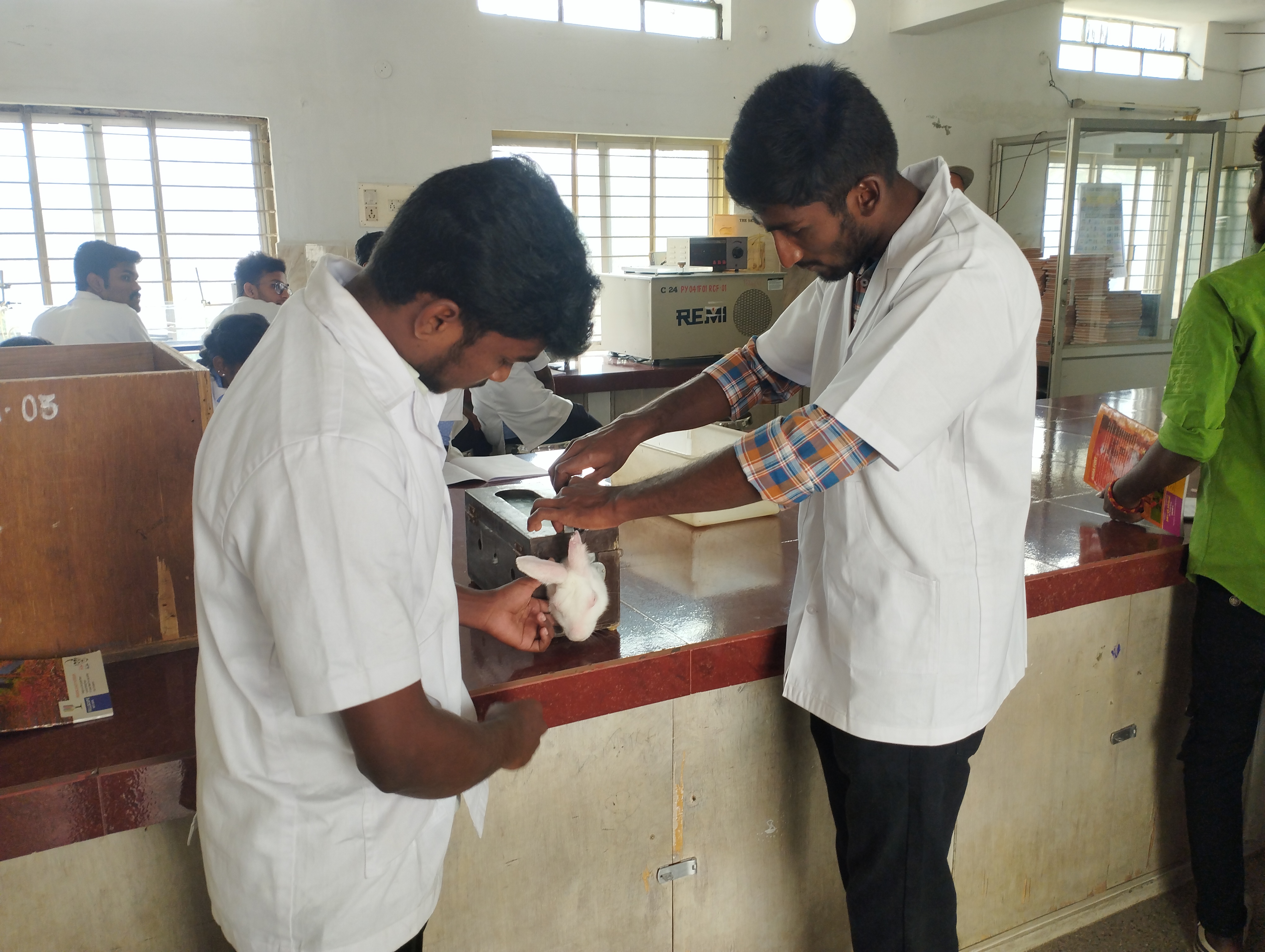 |
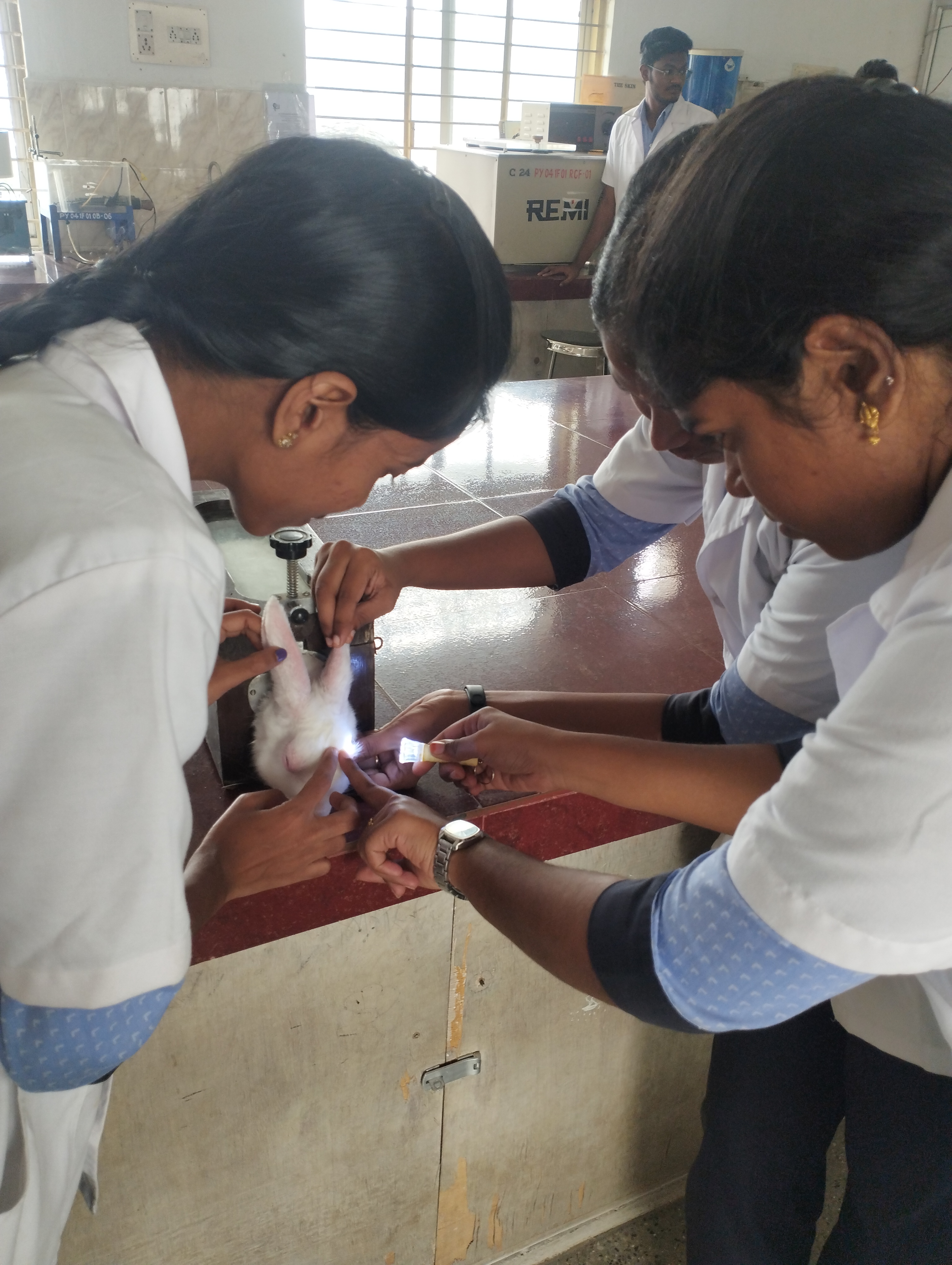 |
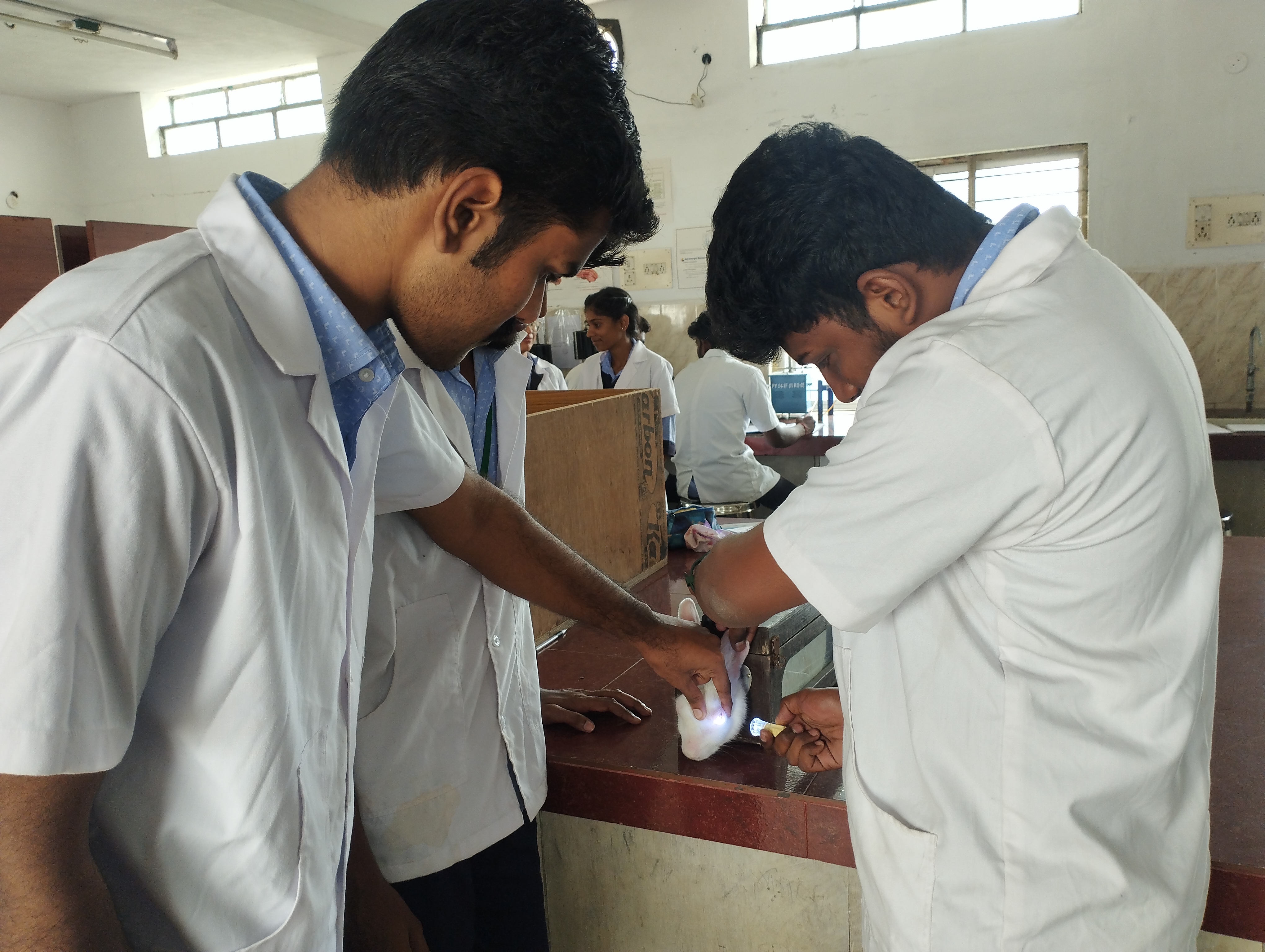 |
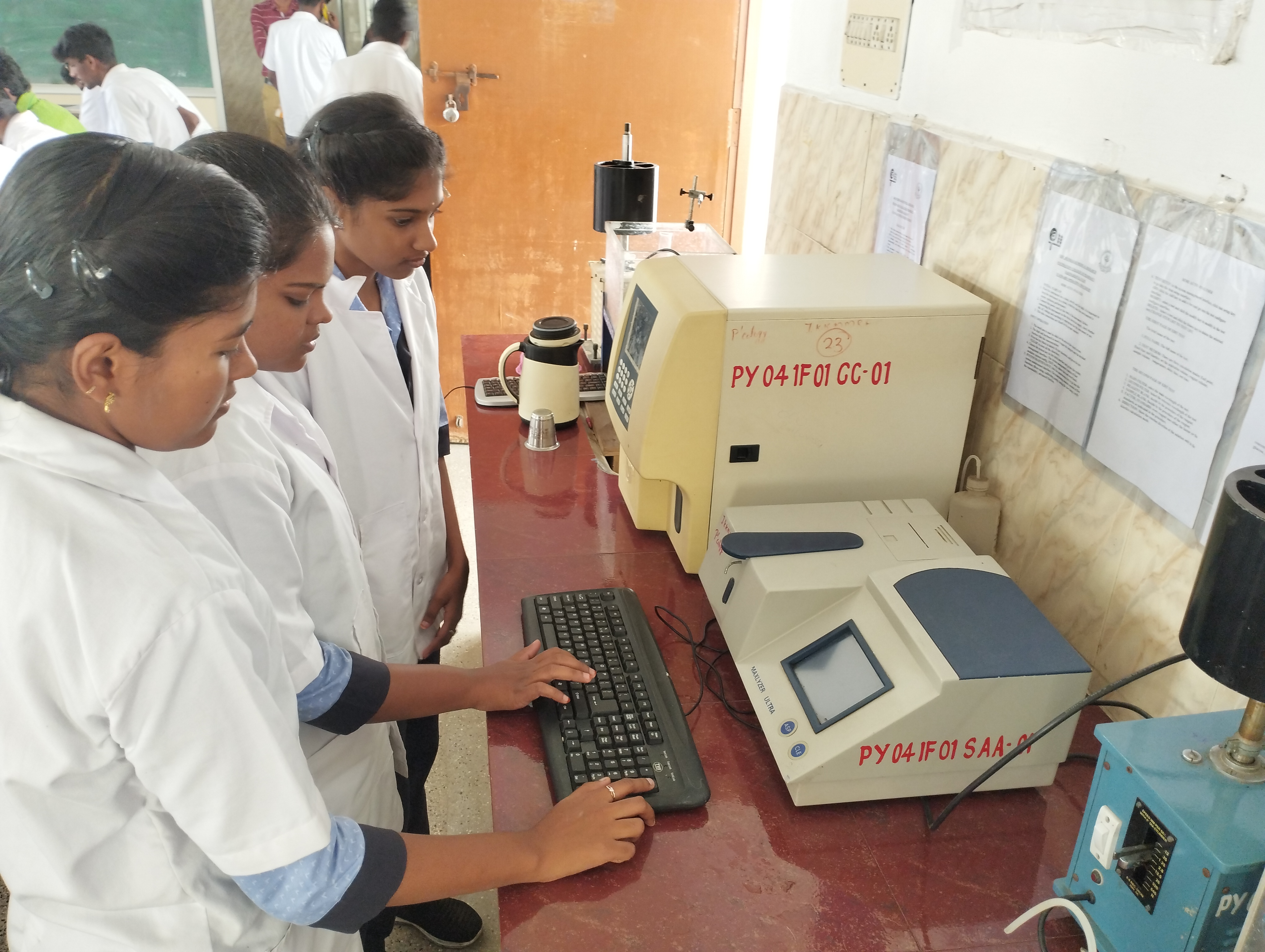 |
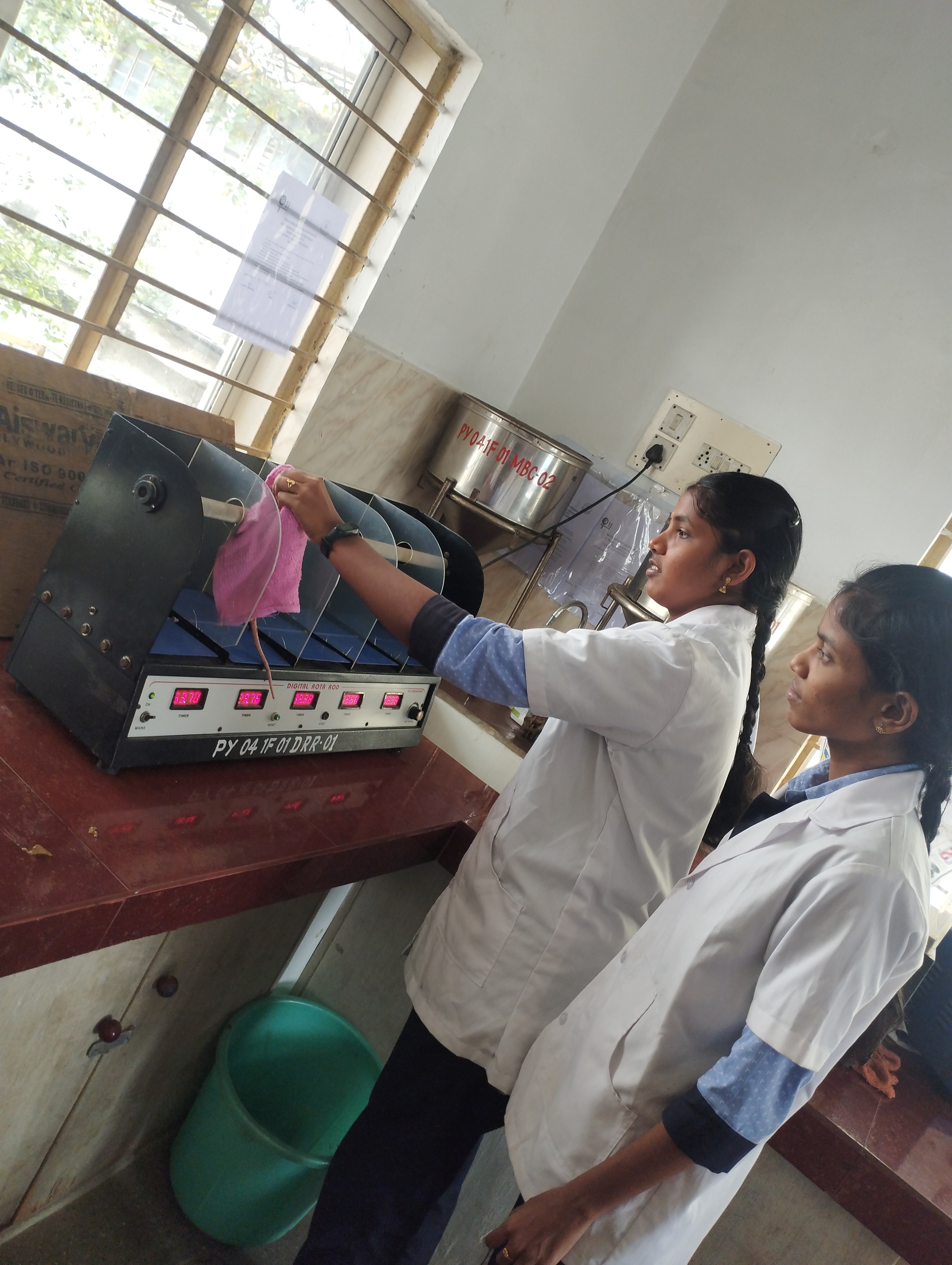 |
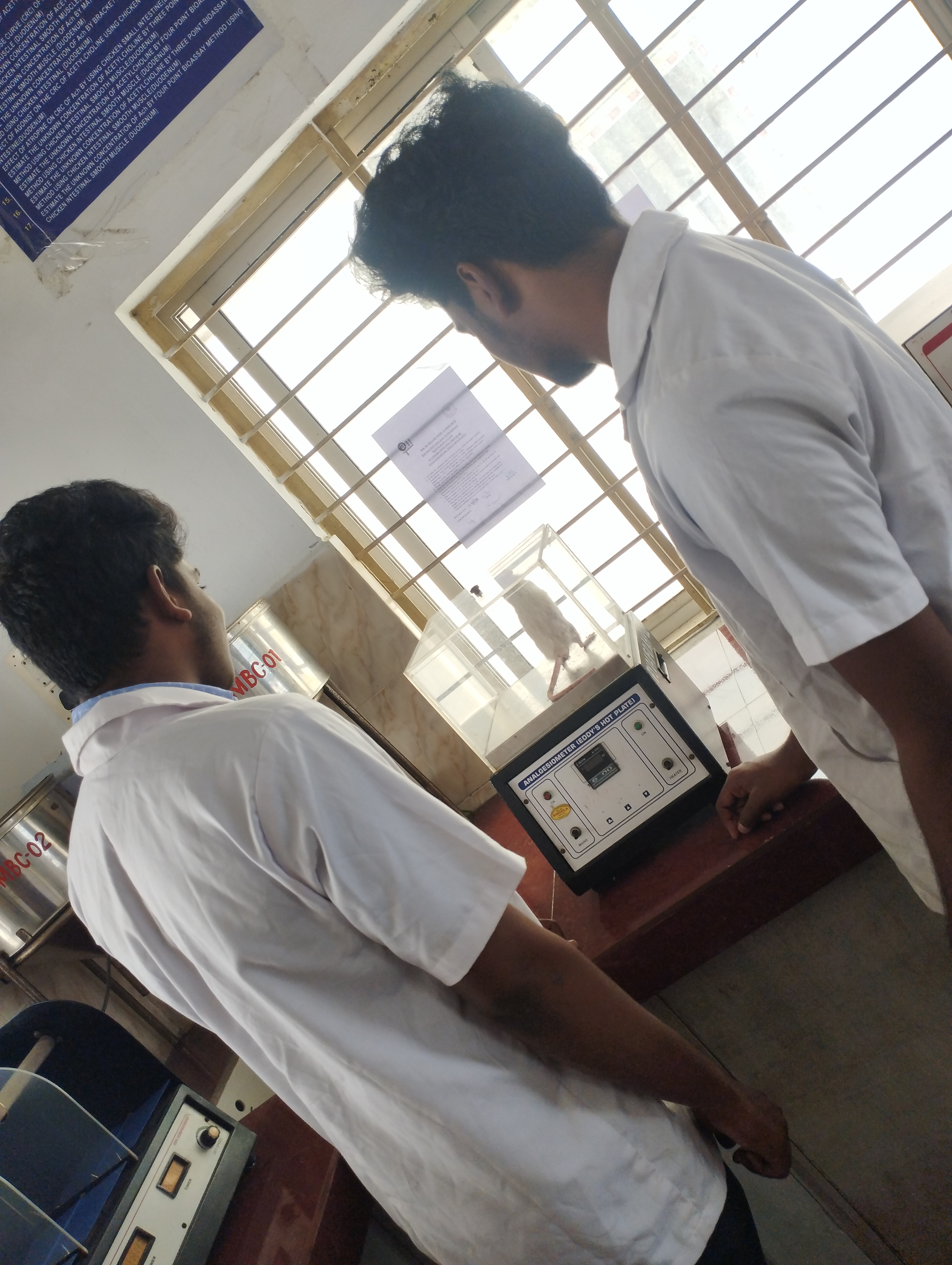 |
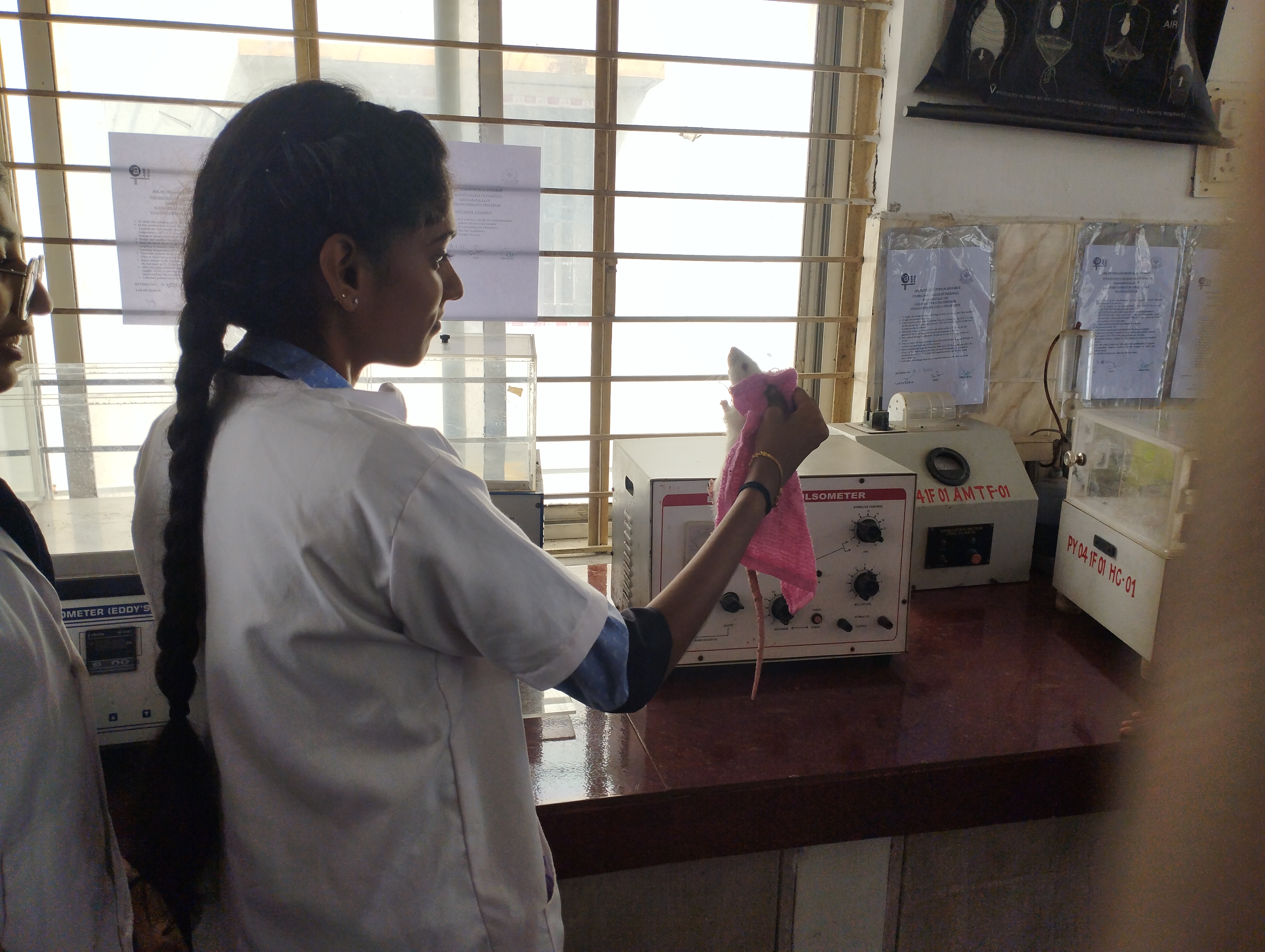 |
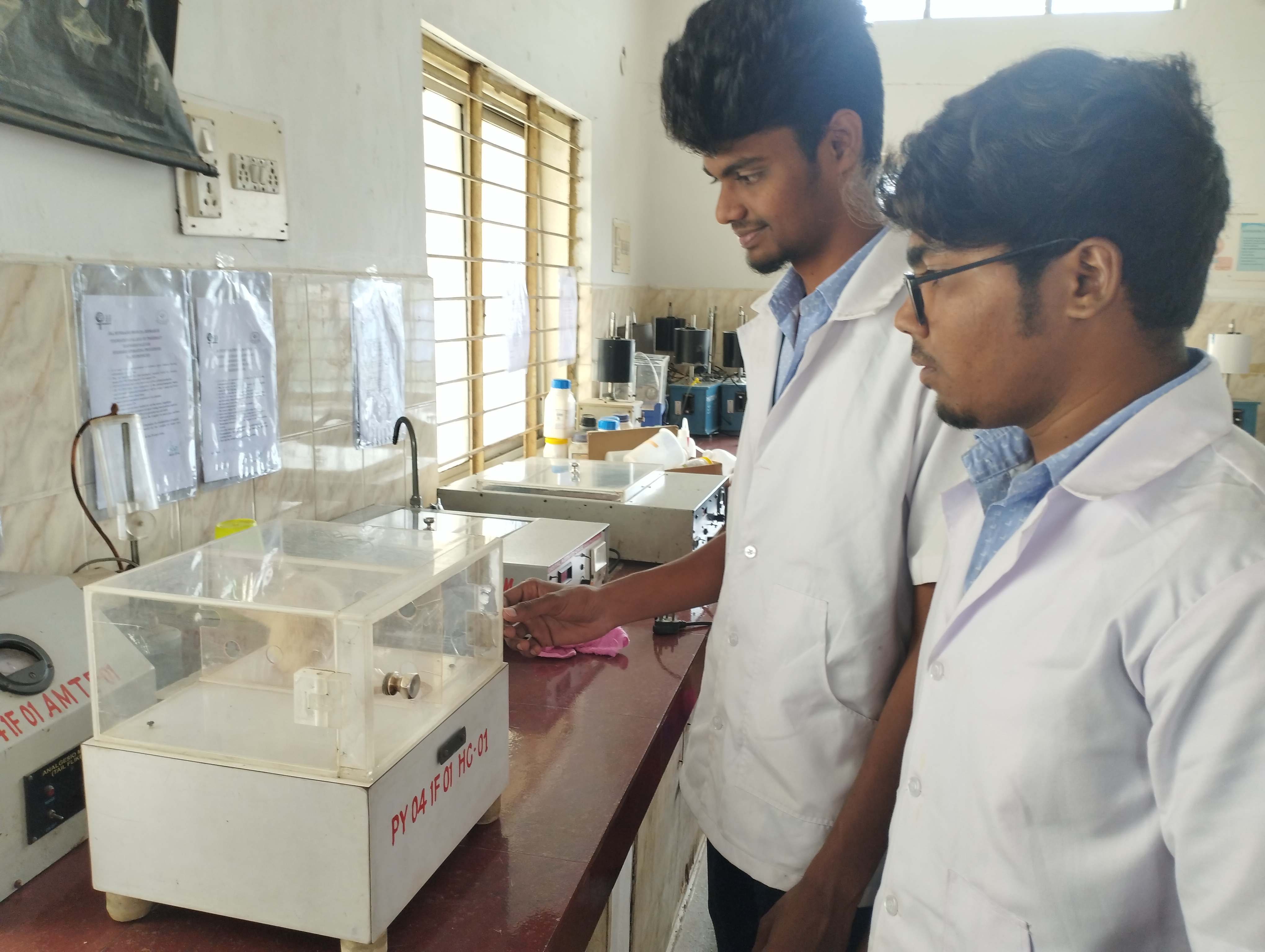 |
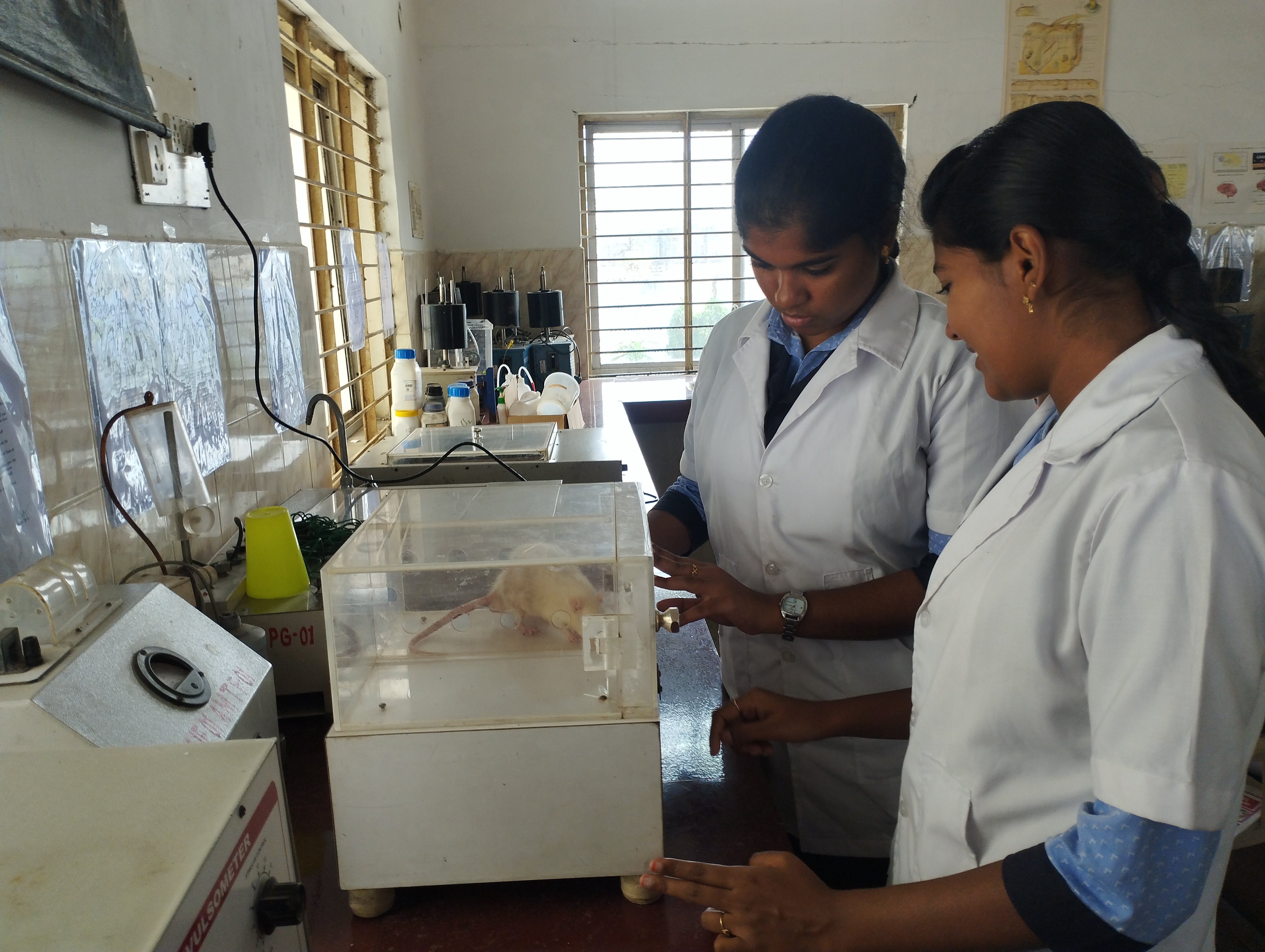 |
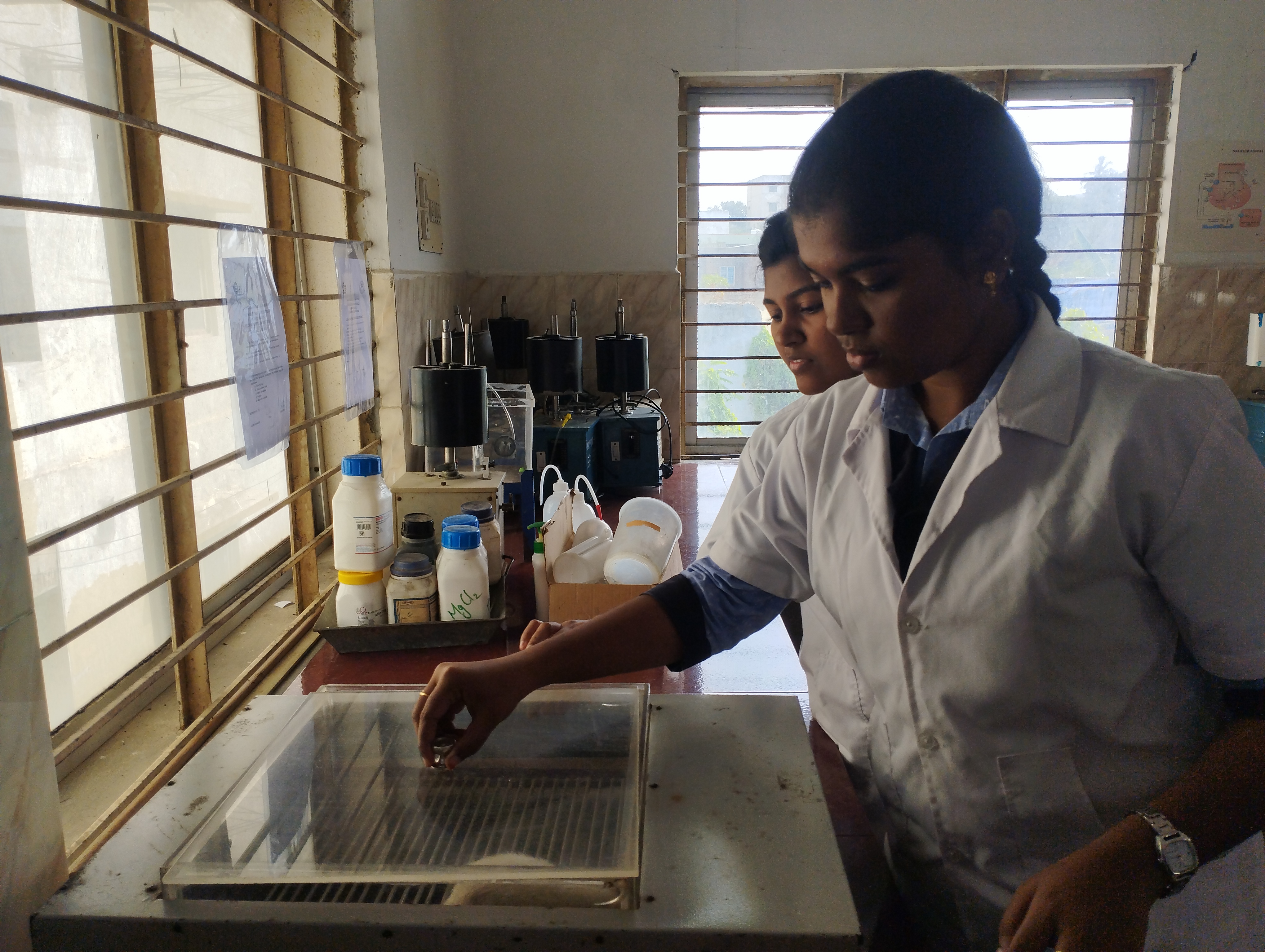 |
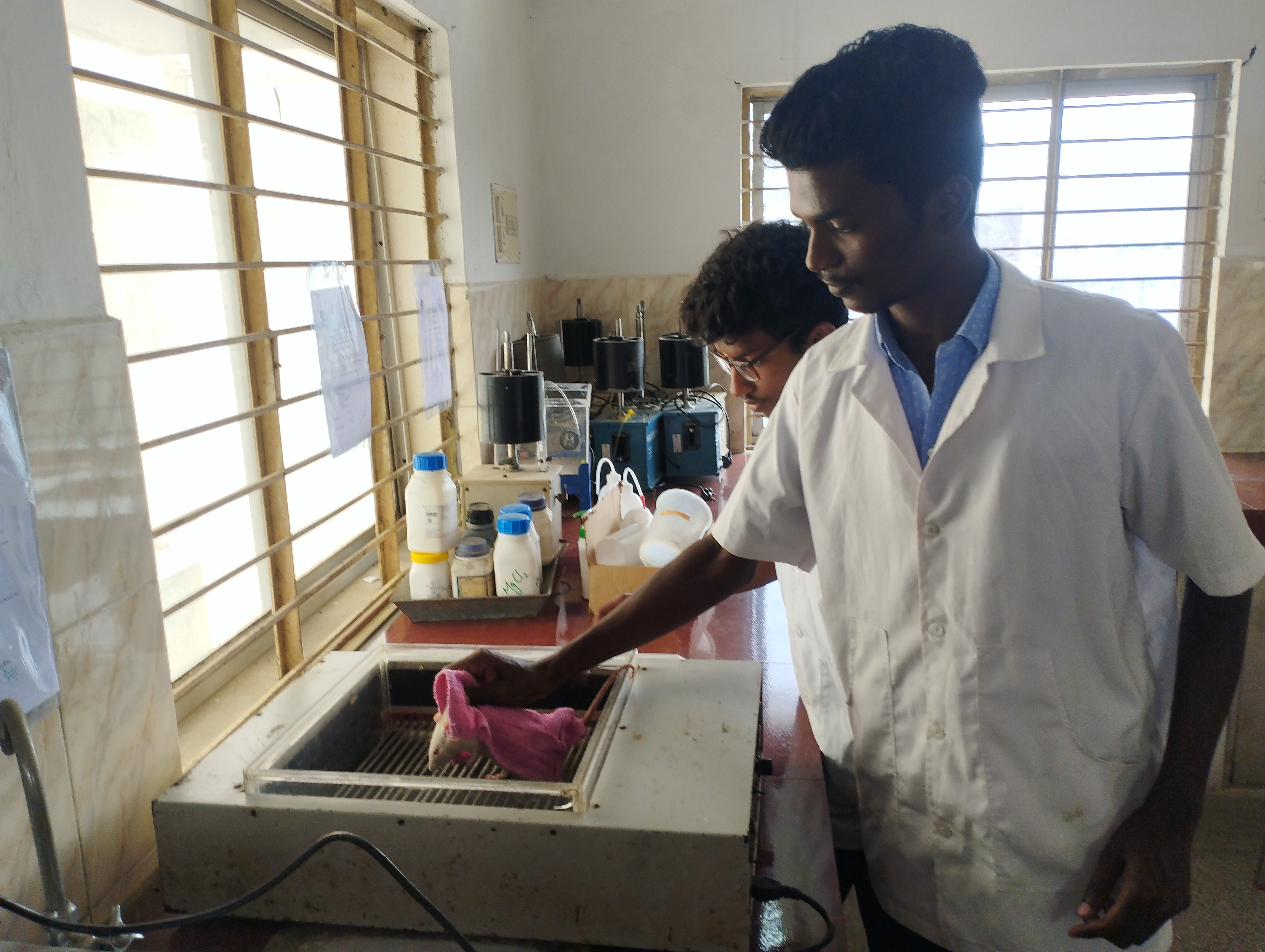 |
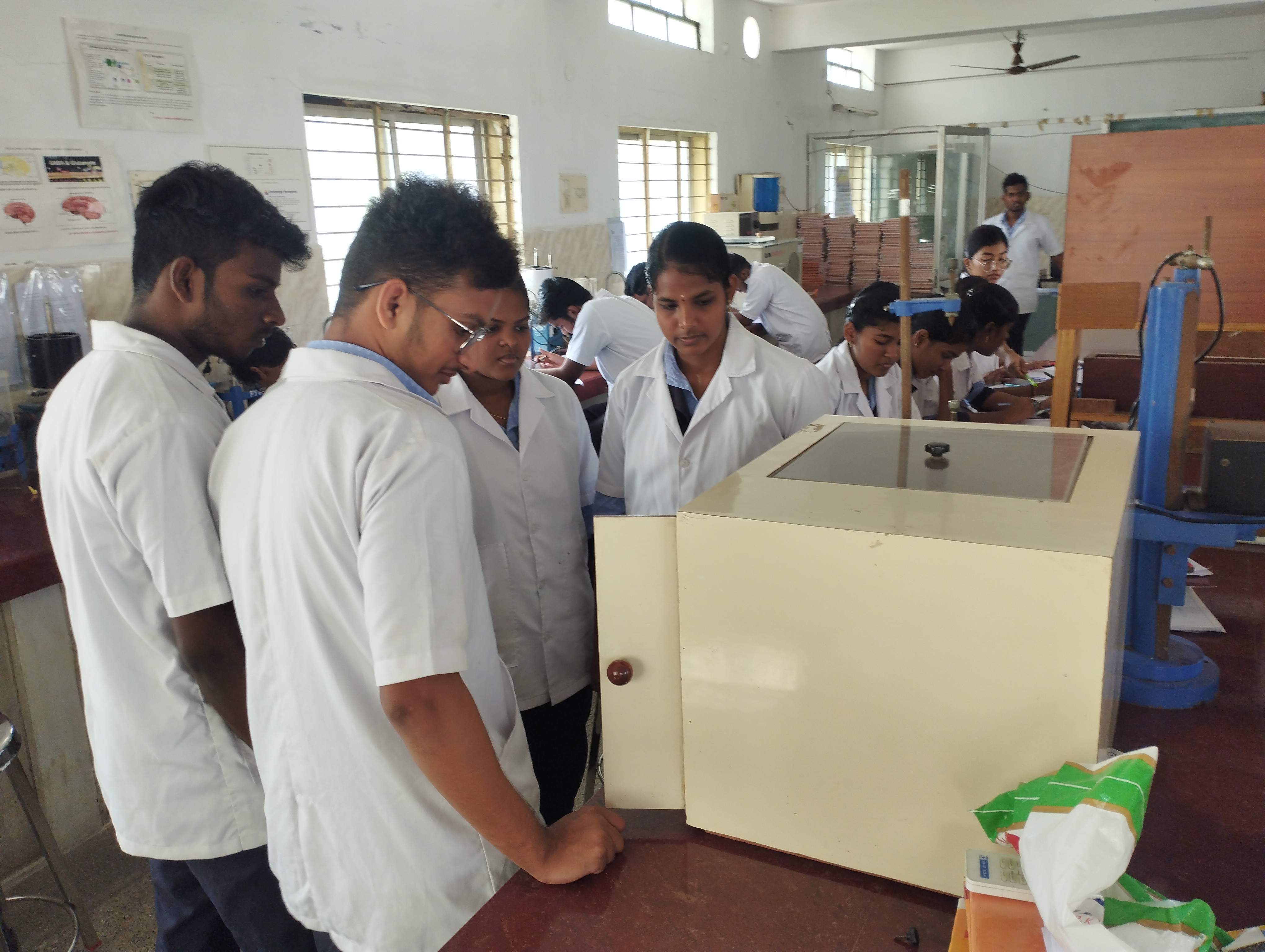 |
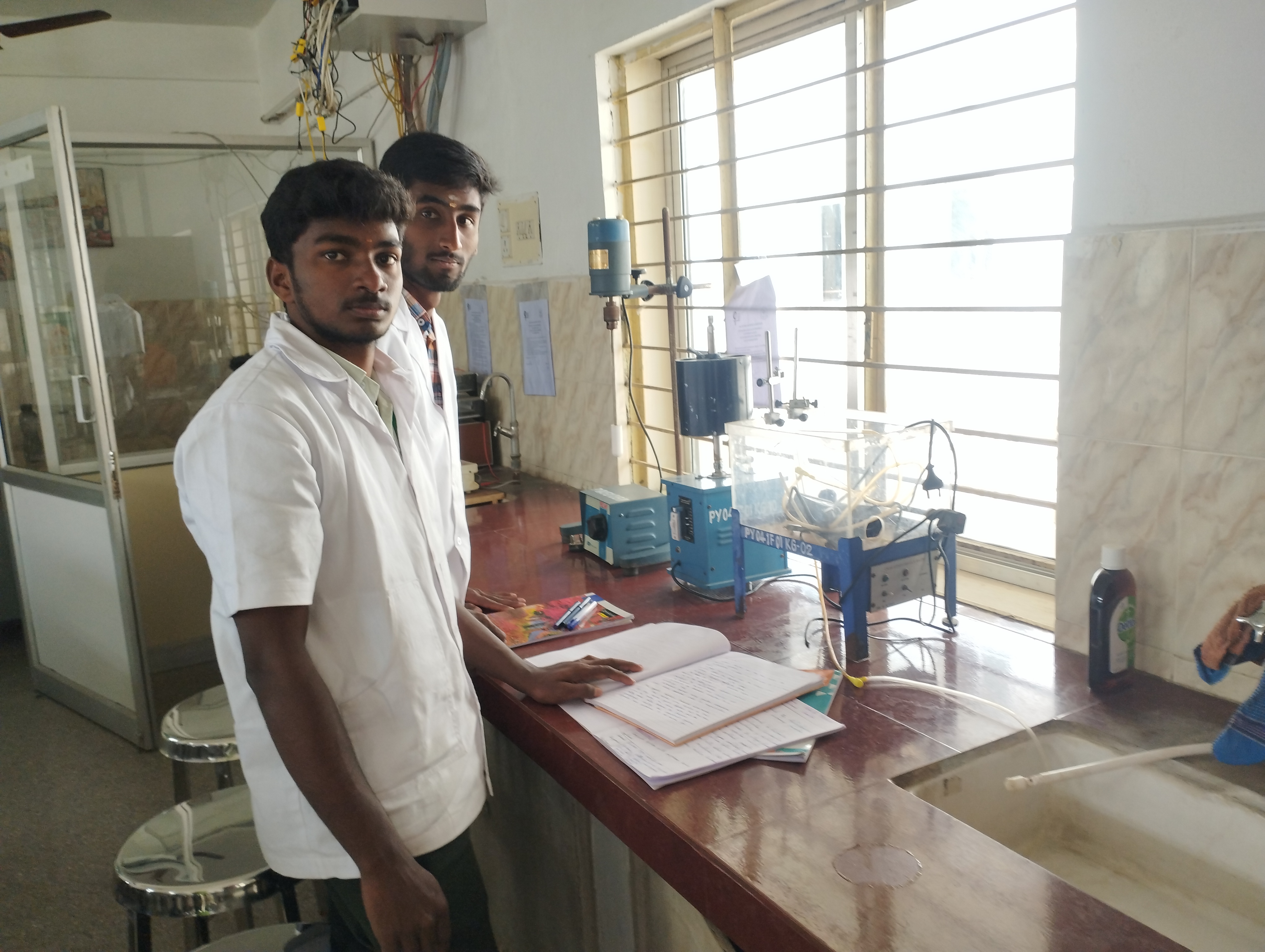 |
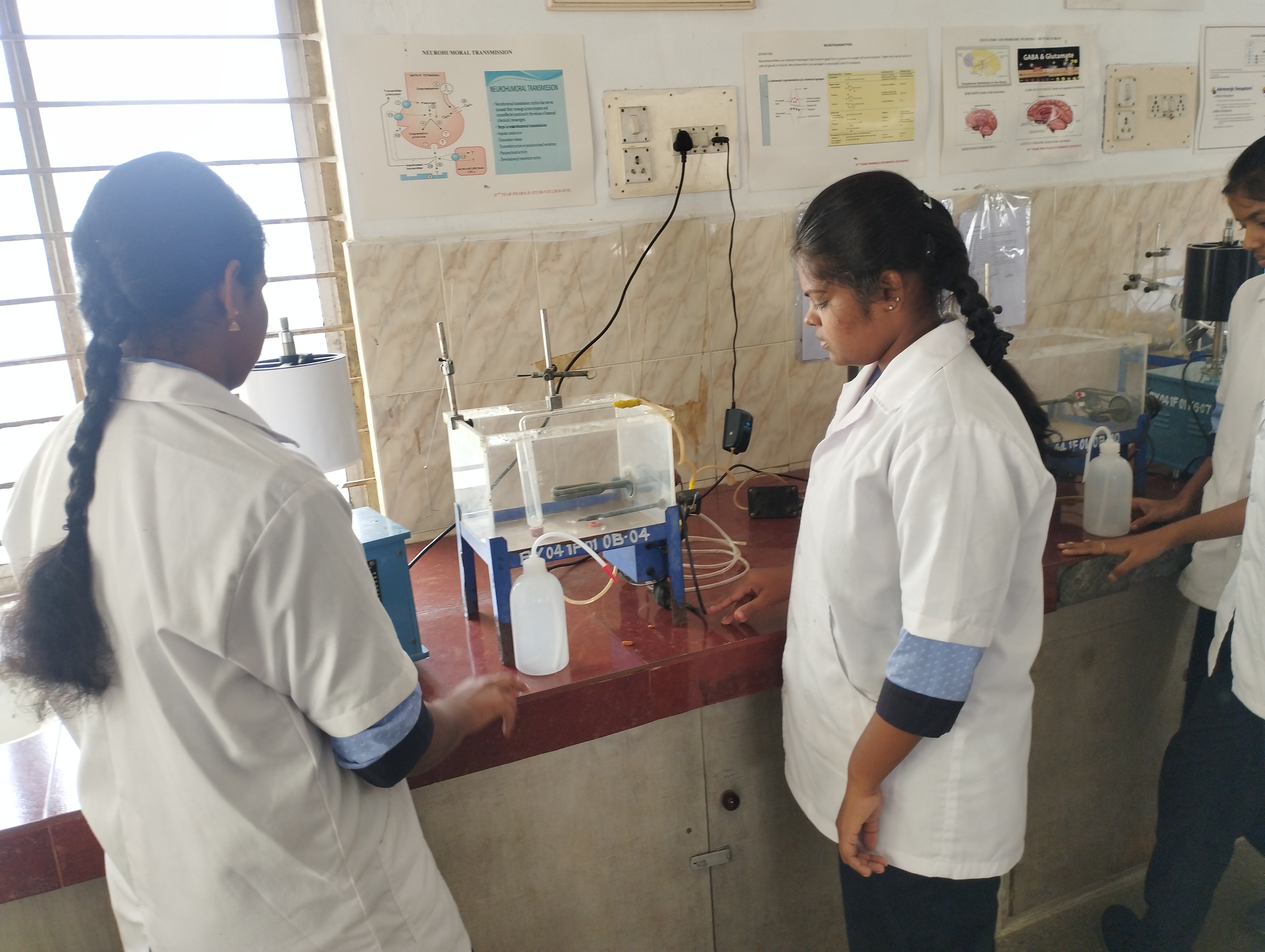 |
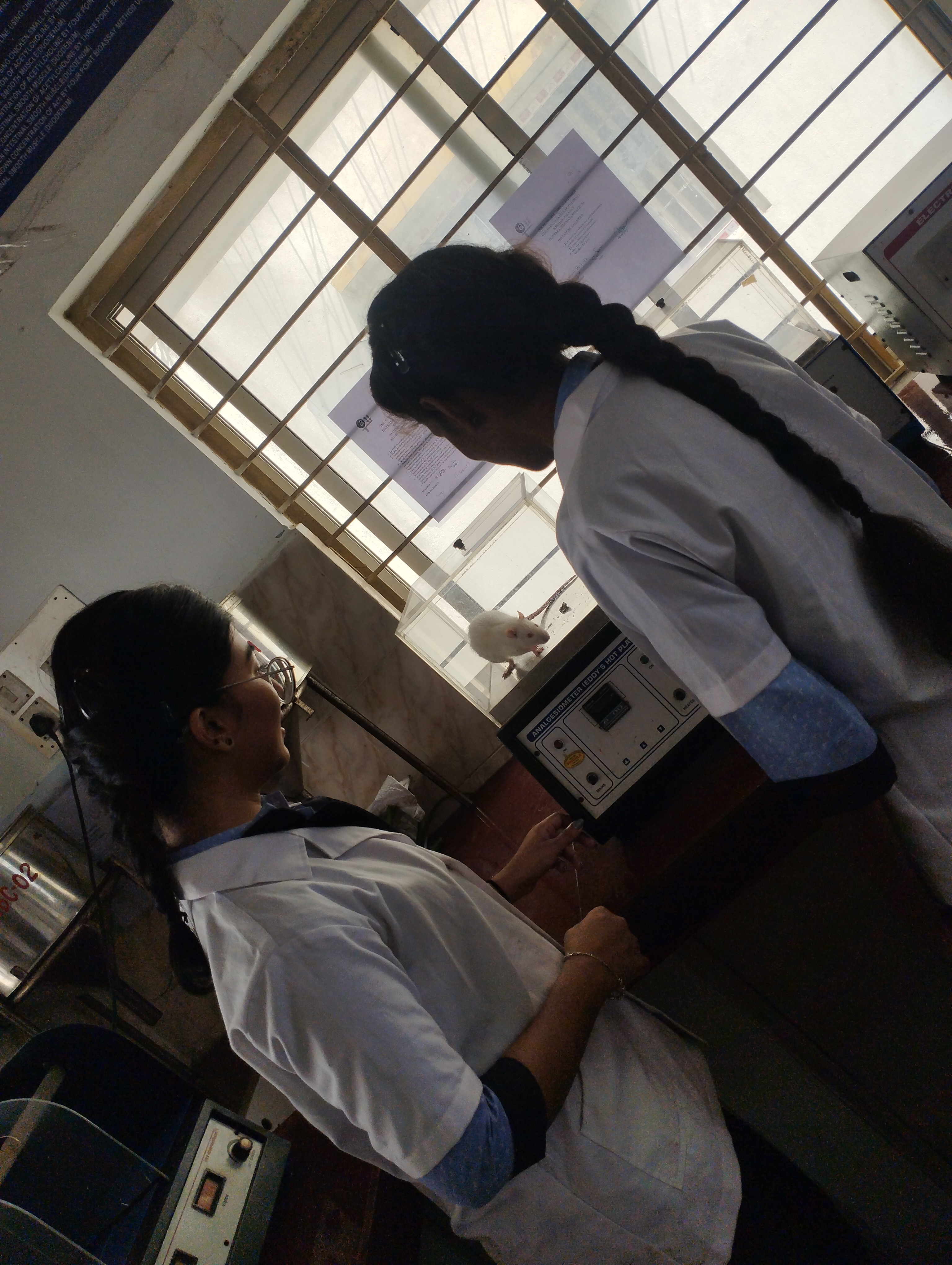 |
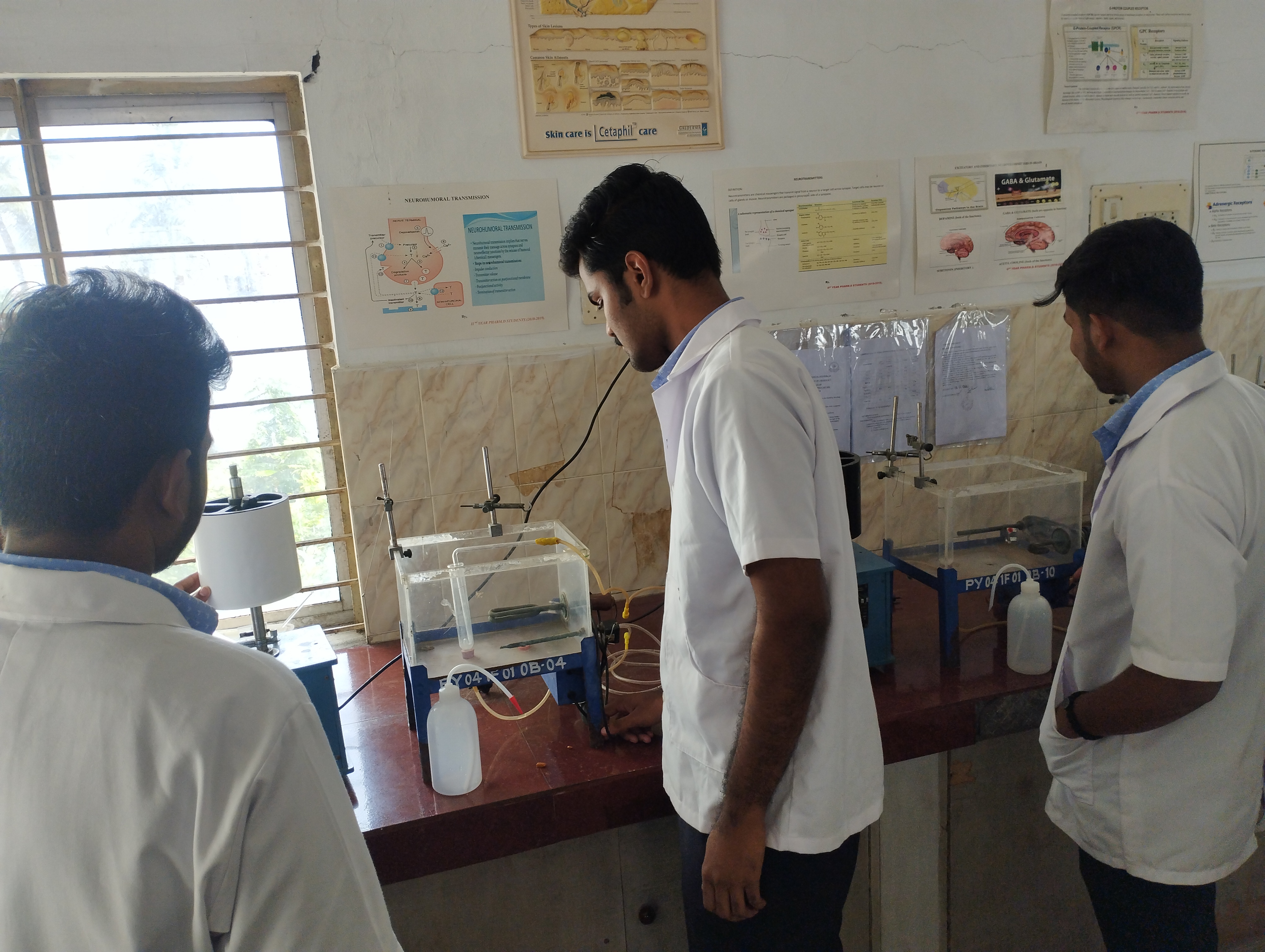 |
MOU
|
S. NO |
Academic year |
Organization with which MoU is signed Date of Signing |
Date of Signing |
MOU Duration |
|
1 |
2018-2019 |
COLUMBIA ASIA HOSPITAL, MYSURU |
30/10/2018 |
5 Years |
|
2 |
2019-2020 |
ATOZETA HEALTH SOLUTIONS PVT. LTD |
01/10/2019 |
5 Years |
|
3 |
2019-2020 |
FREEDOM CARE |
27/09/2019 |
5 Years |
|
4 |
2020-2021 |
CLINOSOL RESEARCH PRIVATE LIMITED |
05/10/2020 |
5 Years |
|
5 |
2021-2022 |
MAARUTHI MEDICAL CENTRE AND HOSPITALS,ERODE |
19/01/2021 |
5 Years |



 1800-180-5522
1800-180-5522